#but like. the impact a father has on one’s life cannot be understated
Explore tagged Tumblr posts
Text
my sister got engaged and we’re all really happy for her but my bitter rain cloud of a dad (who naturally she told last) is giving her a bit of passive aggressive grief about it despite her boyfriend being like the best man of our generation (presumably either because he’s not catholic or because my dad sees them as young dumb unemployed people who aren’t ready for marriage or because he’s mad he barely has any real love with his own wife or something). so like pray for us? i wish i knew what to do
#if my dad had any brain cells or observational skills whatsoever#he’d realize that in terms of our faith the problem is not the boyfriend. that guy is brilliant and open minded and would probably ace RCIA#the problem is my sister. who is catholic in name but it’s clear to me how hard she’s fallen away from the faith#but like my dad has created such a bitter home environment we never have meaningful conversations with him#so like he doesn’t know *anything* about our inner lives#all he sees is labels. all he judges people by is labels#literally you can still get married in the church to a non catholic it’s just a matter of expecting them to convert eventually#and promising to still live according to the principles of the church and raising your children as such#but my parents are absolute fools if they think that’s the issue. if my sister was true in her faith her bf would have converted already#i am sure of it. the guy is smart he just needs to be guided the right way#evidently my parents don’t realize that about him either#if my dad could become a decent parent for once and stop trying to drive his kids away from the faith by only cherrypicking the parts of it#that intersected with republican/conservative boomerisms#ugh. if he was a virtuous father she’d be a virtuous daughter and therefore all her friends and loved ones would be virtuous as well#should i blame my dad for all our family problems? no.. not rightfully……#but like. the impact a father has on one’s life cannot be understated#ugh i’ve had the sense for a while that God wants me to be the one to fix this family#because looking around it doesn’t look like anyone else is gonna do it#but that’s such a daunting task… especially alone… i don’t have any true friends (ie who share both my faith and life experiences)#and like. it’s really hard to try to assume the role of a teacher or counselor when someone is older than you#or uh. in a position of direct power over you for that matter. esp when clearly deeply mentally ill#the concept of trying to essentially parent my own parent while i myself am miserable and unstable#esp when he is the primary cause of that#just. ughhhhh it’s such a vicious circle#like i’ll do this if i have to i’ll undertake that daunting mission but i have to be so careful and really sort myself out first#or for that matter if i were to volunteer to like. catechize my sister’s boyfriend (heaven knows she couldn’t do it)#i’d have to really study my stuff bc i think the intellect is the only real appeal here#like i said tho his conversion can probably never really happen as long as my sister remains the way she is#what i know is that the first step is fixing myself. i have to be a pillar of virtue if i wanna stand as any sort of authority on the faith#problem is i suck and shouldn’t be regarded as a role model for anything. i have the knowledge down but that alone won’t fix me
1 note
·
View note
Text
“Dead. He’s dead.”
“No.” The eunuch’s voice seemed deeper. “He is here. Aegon has been shaped for rule since before he could walk. He has been trained in arms, as befits a knight to be, but that was not the end of his education. He reads and writes, he speaks several tongues, he has studied history and law and poetry. A septa has instructed him in the mysteries of the Faith since he was old enough to understand them. He has lived with fisherfolk, worked with his hands, swum in rivers and mended nets and learned to wash his own clothes at need. He can fish and cook and bind up a wound, he knows what it is like to be hungry, to be hunted, to be afraid. Tommen has been taught that kingship is his right. Aegon knows that kingship is his duty, that a king must put his people first, and live and rule for them.”
(ADWD Epilogue)
Varys’ words to Kevan Lannister about Prince Aegon are so interesting because of the overarching insinuation that the boy has had a slew of advisors and teachers who have carefully and extensively prepared him for the task of ruling. His listed examples to that point are rather peculiar, however: a knight to train him in arms, a septa to train him in the faith, and various tutors to train him in history and languages.
Now there’s nothing inherently wrong about Aegon’s educators but one has to ask, what do these people even know about actual ruling? What have they seen about the nature of ruling and the nitty gritty of it? What experience do they have? And if they themselves don’t really know what it means to rule, what does that say of their young prince’s education?
It’s an important question to ask when we consider Aegon’s narrative foil: Jon Snow. Jon does not have the expectation of ruling. In fact, as a bastard, he knows that he can never ever get a lordship let alone a crown/throne. Yet Jon has, unlike Aegon, a crew of experienced tutors who have shown him the nitty gritty of ruling. Every single one of his on-page mentors is either a ruler or a leader of men; in addition to the other tutors he had growing up.
So I wanted to take a look at Jon’s mentors and the positions they have held to contrast their experience (and thus the validity of the lessons that they give Jon) as opposed to the lack of experience in Aegon’s crew.
Ned Stark - Jon’s first and (arguably) most impactful mentor. While teaching Jon important lessons about rulership, he was serving as the Lord of Winterfell and Warden of the North; thus making him one of the most powerful men in the entire realm. He then went on to serve as Hand of the King - the most powerful official save for the king. The irony is that Ned didn’t teach Jon as a successor. Robb was the one meant to succeed him. Yet Jon absorbed his lessons all the same.
Benjen Stark - we don’t actually see much on-page mentorship from Benjen, yet he still is one of Jon’s many father figures in the series. He is a a man of the Night’s Watch so he is sworn to hold no lands or titles. Yet as First Ranger, he is undoubtedly one for he highest ranking officials in the Watch and potentially a skilled warrior. He takes on the role of the knight or leader of men among Jon’s teachers.
Tyrion Lannister - despite being an ‘outsider’, Tyrion comes to hold considerable power. He is an exceedingly learned and intelligent man and managed to impart important life lessons during his short time with Jon. He rises to become Hand of the King and later Master of Coin. Though he doesn’t actively teach Jon how to rule, he’s still an important part of Jon’s character development.
Maester Aemon - one of the anomalies in this list. Yet his impact on Jon’s life cannot be understated. He is a teacher to Jon; we have various references to Jon going to Aemon for advice on how to lead. Aemon also gives Jon advice meant for kings: “kill the boy and let the man be born”. What makes Aemon an interesting addition is that he is a would-be king. And an interesting contrast between Jon and Aegon is that both parallel Aegon V; Jon more organically, Aegon rather artificially. If we remember, Aegon V was a hidden prince who ultimately became king. This is the very same trope that Jon and Prince Aegon are following. And it’s interesting that Aemon, Aegon V’s brother, gives advice on governance to Jon; the same advice given to the unlikely king. So it’s Jon who is carrying the torch of kingship from Aegon V, not Young Griff.
Jeor Mormont - one of the most direct mentors in Jon’s arc. Not only is he a surrogate father to Jon, he does what Ned never did: he directly grooms Jon to be his heir. Jon gets to watch Jeor actually govern the NW as his steward but it’s interesting that he shadows the LC through servitude. Though Jon is intended to succeed the Old Bear, he has to humble himself; he has to follow before he can lead. It’s a contrast to Aegon who would hold power over most (if not all) of his tutors.
Donal Noye - the other anomaly save for Maester Aemon. He is a humble Blacksmith. Yet he has been in the service of kings (having served the Baratheon boys who would all end up as kings). He plays an important role in bringing Jon’s ego back to earth and helping him sympathize with those less fortunate than himself. Despite his humble origins, he does briefly take command of the Wall during Mance Rayder’s attack and then transfers that command to Jon, purely because he believed in Jon’s ability to lead (and he was right).
Qhorin Halfhand - another who takes on the role of a skilled master at arms for Jon. He is an undoubtably powerful warrior. But he is also a leader of men. He teaches Jon important lessons on leadership during their time together beyond the Wall - e.g., to lead your men you must first know them. And in true ‘fridged mentor’ fashion, Qhorin dies so the young prince can take over and grow as a leader.
Mance Rayder - the King Beyond the Wall and one of the most important leaders in the books despite spending all his time in the North. Mance’s role as a mentor for Jon is doubly important given that he also takes on the role as a Rhaegar proxy. Despite Jon coming to him as an (undercover) enemy, he’s still able to impart powerful lessons on how to command an army and wrangle support from different factions of men. Jon learns a lot about diplomacy from observing and being under the KBTW. Mance is a skilled warrior, commander, and politician. A charismatic and gifted man - the picture perfect king for Jon to emulate.
Tormund Giantsbane - a leader of the freefolk who rises to become an unlikely ally for Jon. A skilled warrior and proven leader (we know that he took charge of a couple of thousand of freefolk), Tormund becomes important when there’s a transfer of power from Mance to Jon as leader of the freefolk.
Stannis Baratheon - by law, he is the rightful king of the seven kingdoms. According to prophecy, as Melisandre says, he is the promised messiah. Despite a less than ideal personality, he’s still an important part of Jon’s political arc in ADWD. Arguably a man of immense administrative potential, Stannis is also one of the most successful military commanders in the series; which is great for Jon since he also learned from Ned, who ran an undefeated streak as a battle commander.
The total count now comes to: two kings, two Hands of the King, a ruling lord, three warriors, one wise maester (who has counseled a king), and one commander. That quite a resume for Jon. All these men have some experience leading men and commanding armies, however big or small. So Jon’s preparation has been quite thorough.
What a stark contrast between the two boys, then. Varys’ words give us a roadmap of a “perfect ruler” (or as perfect as one can be) yet when we actually take the time to examine what we see in the text, Aegon is not at all suited for that role - Jon is. In fact, not a single character in ASOIAF has had the intensive preparation to rule that Jon has.
It’s beautiful irony. The prince, the one promised to rule, is actually quote underprepared for the task of it. Meanwhile the bastard, who is at best promised a life of servitude, is the one with the most preparation (and experience) for rulership. It’s the way Aegon, as a narrative foil to Jon, acts as one who validates Jon’s journey. There are certain things needed of a ruler. Jon has them, Aegon doesn’t.
Winds isn’t out yet so we don’t yet know for certain where these two boys will end up. But I’m almost sure that young Prince Aegon is doomed and though he may hold the throne for a while, he will not be the king at the end of the story. And it just might be his inexperience that ultimately dooms him. So what does that say for Jon then? Aegon can’t hold the throne as he’s unprepared for it, but what about Jon who is?
#jon snow#aegon vi targaryen#young griff#asoiaf#valyrianscrolls#yes I am a Jon will be king at the end of the story believer - that’s the archetype#and so far he’s been following it despite several diversions#he’s the closest character we have to a true to form retelling of King Arthur#Aegon is there to validate Jon’s rise to kingship - he’s not the ruler we should be looking for because Jon is#Aegon is what happens when you make a young boy take on such a terrible task without adequate preparation#he is what happens when your prince in hiding relies almost entirely on blood and his father’s name#which is ironic given varys’ insistence that aegon isn’t entitled - we see that he actually is#Jon is what happens when you actually prepare your king to rule#a prince in hiding who relies on ability and experience - that’s why it’s so important that adwd serves as a training arc for him#and more poignant is the subversion to the trope#unlike most princes in hiding who learn of how special they are quite early in their journeys#jon still knows himself as a bastard - one with no entitlement to anything#Aegon is similar to many fantasy princes because the story starts out with him already knowing who he is#so basically Aragorn#His story has already been written as far as he knows#‘and king Aegon took the throne and ruled wisely for ever and ever’#He knows he’s special and he expects that specialness to carry him to greatness#Jon doesn’t have that so he can only try - try to rule wisely#he can try to rule kindly and equitably#and he’s not perfect - he fails as we see in ADWD - but he tries anyway#remember Aragorn? Perhaps the most famous hidden king in fantasy?#well who do you think answers the question ~what was Aragorns tax policy?~#spoiler alert - it’s not Aegon!#my stuff
62 notes
·
View notes
Text
Pere Lachaise (#2)
Today I visited Pere Lachaise Cemetery and I felt a new appreciation for spaces of reflection on life after death. Unlike the hauntingly empty cemeteries of my small town, this was a sprawling public park, more similar to a dense collection of sculptures than graves. When I say sprawling I mean it. This lieux de memoire is absolutely enormous. The park is made up of numbered ‘divisions’ in which the various types of graves are tightly packed together with only very small walking paths in between them. The strong majority of the graves on the outskirts of the divisions were various types of mausoleums and crypts. These mammoth burial sites are truly works of art including brass sculptures and examples of architecture that are frequently reserved for government buildings, museums, and churches. In the interior spaces were different types of above ground graves that looked relatively similar to the shape of a coffin: often with plants growing out of the top. While they were all a mix of different years, the trend seemed to be that the older graves were near the front and the newer graves towards the rear of Pere Lachaise.
The density of the cemetery is certainly needed because of the sheer number of people in Paris and how astonishing old the city is. It is easy to forget, in Paris, just how long the city has been here because of Hausman’s renovations in the 1800s. I find that only in the Gothic churches and random older streets give me a sense of the age of the city. Pere Lachaise was another site for me that allowed for a real sense of how long the city has existed. It was not always the major burial ground of Paris and only represents a small fraction of the people and years of the city’s occupants, but when someone is standing amongst that many graves one cannot help but appreciate just how many people have walked the streets before them.
I was interested to see the grave of Édith Piaf on my visit to the cemetery. She is a singer that I have been interested in for a long time as I used to translate her songs to help me learn French when I was in high school. Her songs have been some of, if not the most famous French songs in the world since her career took off in the 1940s. In the back of the park is her grave. Unlike the large, luxurious mausoleums of the front of Pere Lachaise, her place of rest is highly understated. Made out of black granite, flat with a cross on top, she is buried with her father and last husband. The grave next to her is her daughter’s grave who passed away at only two. Despite the simplicity of the grave, it is one of the most visited graves in the cemetery because of the impact her songs have made on millions of people. While I visited the grave, there was a large crowd around the area and people were waiting in a line to get to look at her last resting place. People had brought various pictures of her and small gifts and flowers to leave on her grave. I think this is very beautiful because instead of being the gradious, impeding grave of other celebrities like Oscar Wilde, what makes her grave exceptional is the living people who are so moved by her work that they pay their own money to adorn the grave themselves. I think for a lot of people, Édith is Paris. What is this city if not “La Vie En Rose” echoing down a Parisian boulevard or “Non, Je ne Regrette Rien” playing proudly in front of the Arc de Triomphe despite all of their gained clichés over time. While the Eiffel Tower is the picture of Paris, Edith is the sound. (647 words)
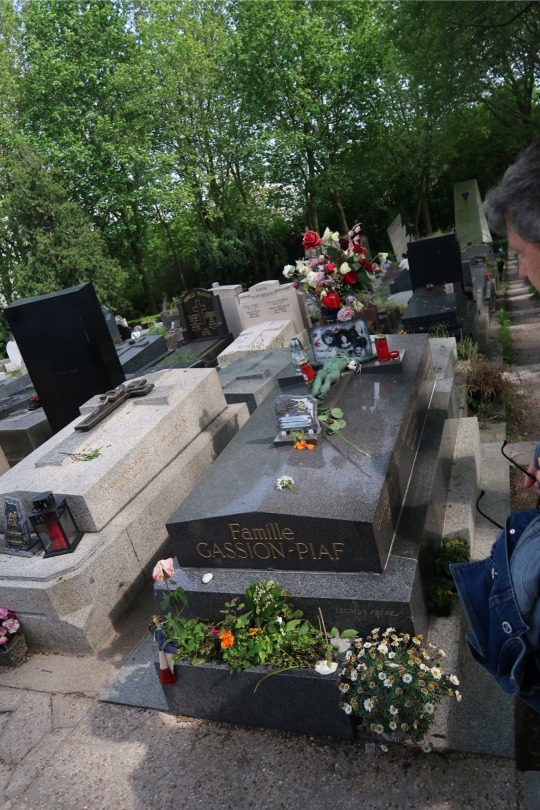

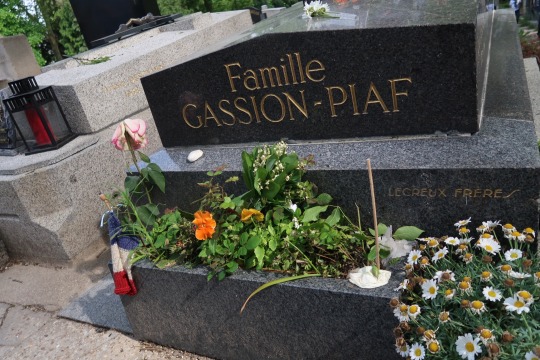
2 notes
·
View notes
Text
I haven’t been in the star trek fandom for very long (I’ve only just started binging the series in the last couple months), so it’s been pretty surprising to find out just how negative the perception of the reboot movies are.
this isn’t coming from the perspective of someone who grew up with the series, so it hit different for me than it might for people with a different relationship to TOS, but I thought it was genuinely clever and Respectful with how it was handled.
To quote leonard nimoy: “Well the alternative timeline gives them license to escape from canon concerns. I can’t see people saying ‘they shouldn’t do that because…’ or ‘that doesn’t tie in to such and such’ because it is a different time and place. Am I right about that?” [Link]
the entire Premise is that the original series happened as it was presented in TOS, but an event late in Spock’s life caused the creation of a parallel universe in which everyone’s lives were significantly altered through two key changes to the timeline. this gives them the freedom to Both revel in fanservice And explore different facets of the characters and their relationships.
the destruction of vulcan Vastly impacts the characters and the plot moving forward, and its a detail that a lot of people take issue with. but the emotional impact of sarek admitting Directly to spock that there is value in his humanity, that his feelings Aren’t wrong, that sarek married amanda because he Loved her cannot be understated. you can read all of these things into sarek as he was in the original series, but he Never had an open conversation about these things with spock. this creates a Believable and Rewarding change in their relationship, where we get to see a different facet of them Because of the changes made. and that’s exactly the appeal. showing us pieces of these characters that we never got in TOS that are nevertheless undeniably Them.
everyone is Different yes, but they’re also fundamentally the same people at their core and that matters.
kirk’s personality obviously takes the biggest change, with him experiencing trauma at a young age, losing his father, and having an implied abusive father figure after that point. he has a harsher personality in reaction to harsher conditions, he’s spikier and harder to love. but he’s also still fundamentally a Good person whose willing to risk everything to help people. he still has what made kirk prime a good captain and a good friend.
I’m not gonna say that it’s the most nuanced story in the world, but it explores a version of kirk that was born from even Less fortunate circumstances than kirk prime, exploring a kirk brimming with potential who learned to bite back after he was kicked down. exploring those themes of trauma and loss, of insecurity and growth, and coming to the conclusion that Fundamentally He Is Capable Of Good isn’t a Bad thing. you don’t have to like it, but his growth into a better person is The Point. they deepened his flaws (all of which were present in a less exaggerated form in TOS) To Show That Growth.
and then of course there’s his relationship with spock.
people are totally justified in not liking that they had a rough start to their relationship, I usually don’t like to see that kind of thing in reboots or hollywood adaptations either, but the way people talk about it is just unfair.
Yes kirk and spock and bones have a very strong relationship in TOS, they also already know each other by the time the show starts. to look at them having to learn to get to know and trust each other when they first meet and say that it’s Bad because they were already full on ride or die for each other in the og series is silly. TOS kirk and spock had to meet and fall in love with each other too, it didn’t just happen over night kings.
secondly, the entire point of the first movie is that Even With reality itself being altered to pull them apart they are fundamentally compatible people that are Bound to each other. they meet each other on bad terms because of circumstances outside of their control, and yet they’re still pulled into each other’s orbit and find the other slotting into place next to them as if they always belonged. one of the first things that spock prime says in the movie is “I am and always will be your friend,” spock and jim are Meant for each other and the movie goes out of its way to explain that. which is what makes it so Weird to see people complaining about how they don’t like each other.
it’s a Different relationship, but it’s absolutely no less steeped in yearning or queer subtext.
speaking of queer subtext ! some people are Very unhappy with spock’s relationship with uhura.
first thing I wanna say is that making the argument that they’re doing anything that the original series hasn’t done is just, completely untrue. kirk has fallen in love with more girls in the og series than he knew what to do with, leonard nimoy was a heartthrob in his time (and he deserves it, awooga) and spock reflects that ! Spock usually turns the women who come onto him down (or when he doesn’t it’s because a plant has literally altered his mind), but there are exceptions to even that. all of three of the main boys have plenty of romance subplots, it happens. if that takes the possibility of them being queer off the table for you (which it shouldn’t, m-spec people exist) then I’m sorry to say that TOS is not exempt.
now, I can understand why Specifically This Relationship could rub people the wrong way or being disappointed that they didn’t outright depict kirk and spock as having a relationship (if not in the first movie then in the following ones after they’ve gotten to know each other), but even in that context the way I’ve seen people talk about it comes off as insensitive.
no, the relationship did not come out of nowhere. they considered having spock and uhura date each other in the original show (and you can see signs of this in the earlier episodes, where uhura very obviously flirts with him and they spend time together in their down time) before they decided against it, and spock was originally going to kiss uhura until shatner insisted that he wanted to do it (because it was the first interracial kiss on tv). [Link 1, Link 2, Link 3]
nichelle nichols was asked about this exact thing (spock and uhura’s relationship in the movie), you can read the interview in full here [Link] but I’d like to highlight this paragraph in particular:
“Now, go back to my participation in Star Trek as Uhura and Leonard (Nimoy) as Spock. There was always a connection between Uhura and Spock. It was the early 60’s, so you couldn’t do what you can do now, but if you will remember, Uhura related to Spock. When she saw the captain lost in space out there in her mirror, it was Spock who consoled her when she went screaming out of her room. When Spock needed an expert to help save the ship, you remember that Uhura put something together and related back to him the famous words, “I don’t know if I can do this. I’m afraid.” And Uhura was the only one who could do a spoof on Spock. Remember the song (in “Charlie X”)? Those were the hints, as far as I’m concerned.”
the film makers looked at the fact there were Hints for uhura and spock, that they were Interested in exploring an interracial couple for the first time (both before and immediately after interracial couples won the right to legally get married) but Couldn’t because of the circumstances of the times and decided to Make that depiction. you don’t have to Like their relationship just because of that fact, but it’s Incredibly reductive to play down it’s significance as just a No Homo cop out. explicitly queer relationships are not the only progressive or culturally important relationships in fiction.
moreover, if you can’t imagine polyamory in the communist utopian future that’s on you.
moreover, this perception that this was a soulless cash grab is just, unfounded.
leonard nimoy returned to the role as spock for the first time in 16 years (since 1991) and this was Entirely because of the respect they had for nimoy, spock as a character, and the franchise as a whole.
Lets look at some quotes from nimoy in interviews regarding the film:
Leonard Nimoy: When I first read the script (...) I immediately contacted J.J. and said “I think it is terrific…I think you guys have done a wonderful job. There is still work to be done, but it is very clear that you and your writers know what you are doing and you know how to do this movie and know what it should be about….and I am very interested.” Then as time went by we worked things out with Paramount, but the most important things were J.J. and the script. (...) I am very pleased about that and I am very comfortable with where this is going. I think the writers have done a terrific job. They have a real sense of the characters and the heart of Star Trek and what it is really all about.
(...)
TrekMovie.com: Now in the case of the new movie you have been retired from acting for years. What was it about this one that made you want to act again and go through the make up again? What was it that made you say ‘I really want to do this?’
Leonard Nimoy: You are right, this is a special situation. First it is Star Trek and so I have to pay attention. I owe that to Star Trek. Second place is that it is J.J. Abrams who I think very highly of, he is a very talented guy. Then came the script and it was very clear that I could make a contribution here. The Spock character that I am playing, the original Spock character, is essential and important to the script. So on the basis of those three elements it was easy to make the decision. So those three things: Star Trek, J.J. Abrams, and an interesting Spock role.
[Link]
Praising the cast playing younger versions of characters from the original 1960s TV series, he [Leonard Nimoy] said: “Let me take the opportunity to say this. Everybody at this table [the cast] are very, very talented and intelligent people.”
“They found their own way to bring that talent and intelligence to this movie, and I think it shows. (...) When Karl Urban introduced himself as Leonard McCoy and shook hands with Chris Pine, I burst into tears. That performance of his is so moving, so touching and so powerful as Doctor McCoy, that I think D. Kelley would be smiling, and maybe in tears as well.”
“The makers of this film reawakened the passion in me that I had when we made the original film and series. I was put back in touch with what I cared about and liked about Star Trek, and why I enjoyed being involved with Star Trek. So, it was an easy way to come on home.”
“[In this Star Trek] they said things and showed me things, and demonstrated the sensibility that I felt very comfortable with, and I think that shows in the movie. I like it.”
[Link 1, Link 2]
again, you don’t have to like it just because leonard nimoy did, you don’t have to Agree. but the idea that nobody working on the film Cared is provably false. near everyone working on the project was already a fan of the series or were excited to be involved and did their homework. it’s genuinely a Miracle just how much of a labor of love this was, and in my opinion you can feel that through the movie itself. I’d highly recommend looking into interviews and behind the scenes details about the movies. they had a respect not just for the source material, but for leonard nimoy as a person.
there’s definitely more I Could say about this, but it’s 4 am now so I’m gonna shelve it jklfdsa
that said! it’s Fine to not like the movie, not everything is going to be suited to everyone’s taste, but the specific criticisms I’ve seen feel very off base
#star trek#kirk#spock#uhura#nichelle nichols#leonard nimoy#star trek aos#aos#star trek tos#tos#meta#long post#hello followers I write essays about star trek now
114 notes
·
View notes
Text
Arc-V 7th Anniversary
Alright fellas here it is! It’s been 7 years since Yugioh Arc-V first graced our lives, and I thought I’d celebrate this by going over my personal Top 5 Duels in the series! This list is just my opinion, and you don’t have to agree/disagree or whatever, it’s just for fun. Let’s get to it!
#5: Yuya vs Barret, Synchro Arc
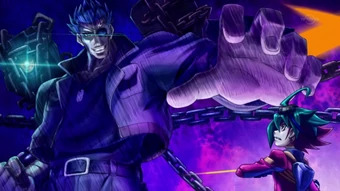
This duel is probably the one that no one expected to be on this list, but it’s actually a critical moment to Yuya’s growth as a character (I know some might have expected the 227 duel here but that one serves more towards narrative parallels and foreshadowing rather than actual character growth). This duel is here for one important reason: It’s the moment where Yuya truly let go of Yusho’s ideals. The Dimensional War had only began to get more chaotic as time passed, with Academia sending no shortage of goons after them, but this is the duel where Yuya is forced to choose: Yuzu’s (and his friends) life, or Smile World (the representation of his father’s ideals). Ultimately, Yuya does choose Yuzu, but this duel is also one of the most agonized we see Yuya after because Yuzu was still kidnapped anyways. To him, he threw away both of them by being forced to choose. However, it’s also what does encourage him to finally take that first step he needed, the buildup to the entire Synchro arc of finding his own words, and challenges Jack for their last rematch
#4: Tsukikage and Sora vs Obelisk Force, Synchro Arc

Ok THIS ONE is the one that no one actually expected, but I really do like it since it’s a good bit of character building for both Sora and Tsukikage (also I didn’t want this list to just be Yuya duels). Tsukikage was a surprising dark horse in Arc V because of how much he actually was developed. His design wasn’t anything special and he was legitimately just hired help by Reiji. However, in this duel we see a ton of incredible character defining moments for him: His grudge against Sora and Academia for what happened to his brother, his commitment not just to Reiji but to the Lancers, his trust in Reira but also his concern, and the tag team with Sora where he makes clear that he never intends to forgive Sora for his involvement with Academia, but he thanks him regardless. This is also the duel that firmly cements Sora as a good guy after about 50+ episodes of him being a villain from his initial heel face turn, where he finally decides that the friends he made in Standard Dimension are too important for him to turn his back on despite Academia being a literal child military. Speaking of…
#3: Shun vs Sora, Maiami Championship
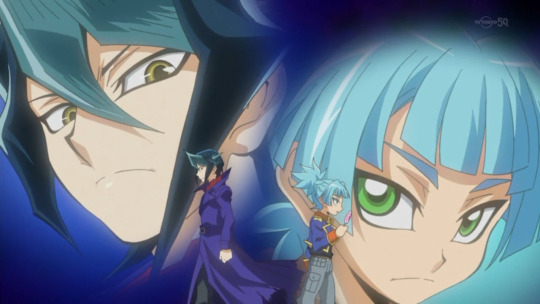
The granddaddy of all tone setting duels in this series, this duel has a lot going for it, but it is phenomenal for one reason alone: how absolutely brutal it is. Yugioh has always gone out of its way to forgive all the cartoon violence in duels as just monsters looking cool, but this duel kicks it up a notch by showcasing just how brutal the Dimensional War between the Fusion and XYZ dimensions was. And mind you, at this point in the series, it was only slightly hinted, and we later see it in more brutal detail in Shun vs Dennis (Friendship Cup) and the duels in the XYZ Dimension, but this duel has another point to its favor: Sora’s heel face turn. At this point, all we knew was that Shun was going around attacking random duelists for no reason. However, it’s when Sora breaks out his own Evil Face™ that we really see the dynamic at play here: Sora is the spy sent to lower everyone’s guards, while Shun is the compassionate avenger that’s trying to prevent another dimension from falling the way his did. No other duel Shun has ever had as much impact as this one with the exception of his duel with Dennis in Synchro, but when put side by side, this is the duel that stands out because it’s when the series truly begins to take its darker turn.
#2: Yuya vs Jack, End of Synchro Arc
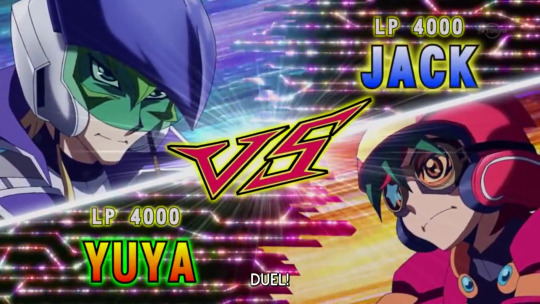
This one I feel is a little controversial, but I absolutely cannot understate just how important this duel is for Yuya’s character. The Synchro arc as a whole was considered a drag by many, and while there certainly are parts that it feels as such, it is undeniable that it provides very critical development for Yuya. This entire time, Yuya has thought that he could simply parrot his father’s ideals as a way to cope with his own insecurities (shirou emiya much? Lmao). However, Jack sees right through his game and completely humiliates him in their first encounter, telling Yuya that he isn’t worthy to stand against him unless Yuya can find his own words instead of the words he borrowed. After this encounter, Yuya tries to force his ideals again, but realizes that he needs to find another way to convey the message and ideals of Duels with Smiles that he wants. His duel with Shinji, Duel Chaser 227 and Crow all had Yuya learn different ways of expressing himself and further evolving his duel, up until this final confrontation. Deciding that instead of letting Academia and The Tops having their way, Yuya squares up and challenges Jack on his own terms for a final rematch. Throughout the duel, we see Yuya apply everything he’s learned so far, but Jack still tells him that he’s holding back and using borrowed words instead of his own, until Yuya finally hits his breakthrough: Pendulum was something he didn’t borrow from anyone, and it’s HIS OWN WORDS to convey his message. With that breakthrough, Jack has finally found an opponent worthy to test himself against once more, because he’s grown so strong that no one in Synchro Dimension was able to challenge him and his drive for self-improvement. Jack in general was such a clutch character to bring back because he’s the exact type of impetus that Yuya needed: A mentor who wasn’t afraid to tell him that he’s simply hiding behind what was given to him, and rather pushed him to achieve greater heights than Yuya himself thought he was capable of.
Alright before the #1 duel, let me list some honorable mentions bc while these didn’t make my top 5, I do still believe they are important and are all fantastic duels in their own right.
Honorable Mentions:
- Yuya vs Kachidoki, Maiami Cup - Yuya vs Gongenzaka, First Match - Shun vs Dennis, Friendship Cup - Yuya vs Yuri, Academia Arc - Yuya vs Battle Beast, Academia Arc - Yuya vs Duel Chaser 227, Friendship Cup - Yugo vs Serena, Friendship Cup - Yuzu vs Masumi, Maiami Cup - Yuya vs Shingo, Yosenju deck Maiami Cup - Shun vs LDS Trio, Start of Series - Yuto-Yuya vs Kaito, Academia Arc - Yuto-Yuya vs Edo, Academia Arc - Yuya vs Reiji, Round 1
And now...
#1: Zarc vs Lancers, Academia Arc
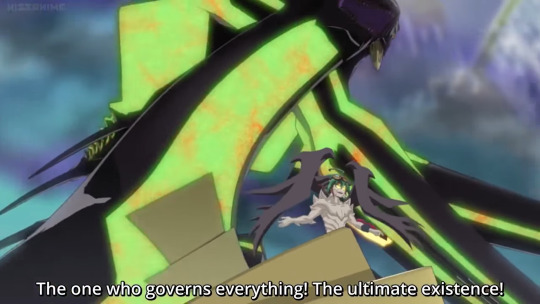
By and far what I consider to be the pinnacle of all duels across the ENTIRE Yugioh series (even beating out Yusei vs Z-ONE), this is less of a duel and more of an all-out war, the culmination of 130+ episodes of masterful foreshadowing and incredible build-up that results in what I consider the best final boss reveal in the series. Arc V is a master of foreshadowing across the series, and kept giving us hints that something BIG was coming, that The Professor and Academia weren’t actually the endgame villains of the series, and after the cast barely manages to eek out a victory against Yuri, it’s ultimately a failure as all the pieces are in place for Yuya to finish his IMA KOSO HITOTSU NI fusion with all his dimensional counterparts. Every single character, good guys, bad guys, and everyone in-between watch as reality falls apart, and births the monster made by their own hands, that is Zarc. I need to reiterate here that the greatest strength of Arc-V is foreshadowing because throughout this duel, we see the application of the ideals that Yuya had developed on his own, as “his own words” are what reaches to the extended cast. It was Yuya’s duty to raise them up as the Pioneer of Pendulum, now it was their job to drag Yuya back from what he has been reduced to. And all throughout, we see how Zarc was made, how he was so similar to Yuya in almost every regard, and we are reminded of all the times Yuya failed but had his friends to help him up, and how Zarc was just a Yuya who had no one to help him when he failed. Zarc who hurt people because it was demanded of him, and ultimately embraced his role as a violent villain as his ultimate act of revenge, because his audience asked for it. And yet, we also see Zarc have his absolute ass dragged by SAWATARI of all characters, and we see just how much of a coward Zarc really was. The entire duel just has so much going for it: Jack-Gongenzaka tag team, Ray and Reiji calling out to Zarc and Yuya, Zarc’s continued insistence that he’s just a monster, It’s So Damn Good. I tell people to watch Yugioh anyways because Yugioh is a great series, but this duel is so good that I would unironically tell people to watch Arc V just so they can watch this duel (outside of the many reasons I recommend arc v). It’s so good, Zarc is such a fun villain, it’s the climax of Yuya’s entire character arc, and I hold it in high regard as the best duel in Arc-V.
Thanks for taking the time to look through this little retrospective on one of my all-time favorite series, here’s to Arc-V’s 7th anniversary!
32 notes
·
View notes
Text
The Supernatural 70s: Part I - Corruption of An Innocent
"We're mutants. There's something wrong with us, something very, very wrong with us. Something seriously wrong with us - we're soldiers writers."
-- with apologies to the screenwriter of "Stripes"
Dear reader, I have the darkest of revelations to make to you, a truth when fully and wholly disclosed shall most assuredly chill you to the bone, a tale that shall make you question all that you hold to be true and good and holy about my personal history. While you may have come in search of that narrative designer best known for his works of interactive high fantasy, you should know that he is also a crafter of a darker art, a scribbler of twisted tales filled with ghosts, and ghouls, and gargoyles. I am, dear innocent, a devotee of horrors! Mwahahahaha!
[cue thunderclap, lightning, pipe organ music]
Given the genre of writing for which most of you know me, I forgive you if you think of me principally as a fantasy writer. I don't object to that classification because I do enjoy mucking about with magic and dark woods and mysterious ancient civilizations. But if you are to truly know who I am as a writer, you must realize that the image I hold of myself is principally as a creator of weird tales.
To understand how and why I came to be drawn to this sub-genre of fantastic fiction, you first must understand that I come from peculiar folks. Maybe I don't have the Ipswich look, or I didn't grow up in a castle, but my pedigree for oddity has been there from the start. My mother was declared dead at birth by her doctor, and often heard voices calling to her in the dead of night that no one else could hear. Her mother would periodically ring us up to discuss events in our lives about which she couldn't possibly have known. My father's people still share ghost stories about a family homestead that burned down mysteriously in the 1960s. Even my older brother has outré memories about events he says cannot possibly be true, and as a kid was kicked off the Tulsa city bookmobile for attempting to check out books about UFOs, bigfoot, and ESP. It's fair to say I was doomed - or destined - for weirdness from the start.
If the above listed circumstances had not been enough, I grew up in an area where neighbors whispered stories about a horrifically deformed Bulldog Man who stalked kids who "parked" on the Old North Road near my house. The state in which I was raised was rife with legends of bigfoots, deer women, and devil men. Even in my childhood household there existed a pantheon of mythological entities invented explicitly to keep me in line. If I was a good boy, The Repairman would leave me little gifts of Hot Wheels cars or candy. If I was being terrible, however, my father would dress in a skeleton costume, rise from the basement and threaten to drag me down into everlasting hellfire (evidently there was a secret portal in our basement.) There were monsters, monsters EVERYWHERE I looked in my childhood world. Given that I was told as a fledgling writer to write what I knew, how could anyone have been surprised that the first stories I wrote were filled with the supernatural?
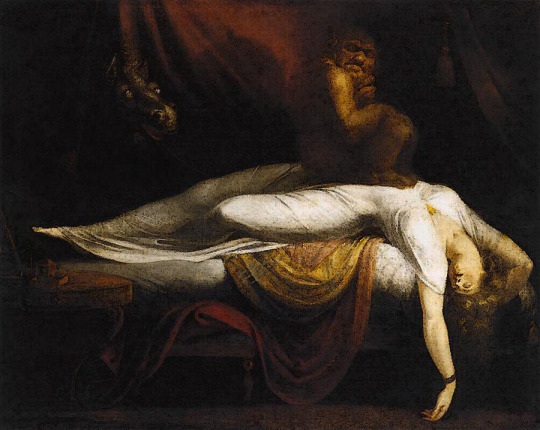
"The Nightmare" by John Henry Fuseli (1781)
My formative years during the late sixties and early seventies took place at a strange juncture in our American cultural history. At the same time that we were loudly proclaiming the supremacy of scientific thought because we'd landed men on the moon, we were also in the midst of a counter cultural explosion of interest in astrology, witchcraft, ghosts, extra sensory perception, and flying saucers. Occult-related books were flying off the shelves as sales surged by more than 100% between 1966 and 1969. Cultural historians would come to refer to this is as the "occult boom," and its aftershocks would impact popular cultural for decades to come.
My first contact with tales of the supernatural were innocuous, largely sanitized for consumption by children. I vividly remember watching Casper the Friendly Ghost and the Disney version of the Legend of Sleepy Hollow. I read to shreds numerous copies of both Where the Wild Things Are and Gus the Ghost. Likely the most important exposure for me was to the original Scooby Doo, Where Are You? cartoon which attempted to inoculate us from our fears of ghosts and aliens by convincing us that ultimately the monster was always just a bad man in a mask. (It's fascinating to me that modern incarnations of Scooby Doo seem to have completely lost this point and instead make all the monsters real.)
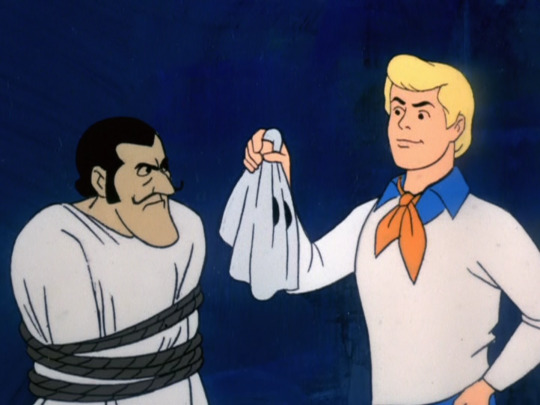
ABOVE: Although the original cartoon Scooby Doo, Where Are You? ran only for one season from 1969 to 1970, it remained in heavy reruns and syndication for decades. It is notable for having been a program that perfectly embodied the conflict between reason and superstition in popular culture, and was originally intended to provide children with critical thinking skills so they would reject the idea of monsters, ghosts, and the like. Ironically, modern takes on Scooby Doo have almost entirely subverted this idea and usually present the culprits of their mysteries as real monsters.
During that same time, television also introduced me to my first onscreen crush in the form of the beautiful and charming Samantha Stevens, a witch who struggles to not to use her powers while married to a frequently intolerant mortal advertising executive in Bewitched. The Munsters and The Addams Family gave me my first taste for "goth" living even before it would become all the rage in the dance clubs of the 1980s. Late night movies on TV would bring all the important horror classics of the past in my living room as Dracula, Frankenstein, the Wolf Man, the Invisible Man, the Phantom of the Opera, The Creature from the Black Lagoon, and Godzilla all became childhood friends. Over time the darkened castles, creaking doors, foggy graveyards, howling wolves, and ever present witches and vampires became so engrained in my psyche that today they remain the "comfort viewing" to which I retreat when I'm sick or in need of other distractions from modern life.
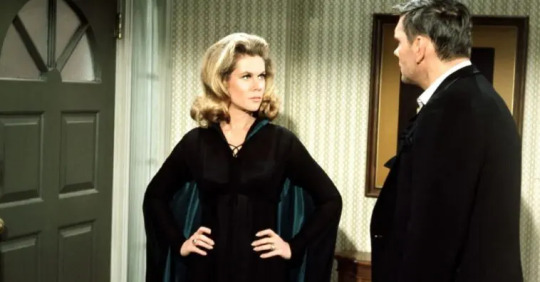
ABOVE: Elizabeth Montgomery starred in Bewitched (1964 - 1972) as Samantha Stephens, a witch who married "mortal" advertising executive Darren Stephens (played for the first five seasons by actor Dick York). Inspired by movies like I Married a Witch (1942) and Bell, Book and Candle (1958), it was a long running series that explored the complex relationship dynamics between those who possess magic and those who don't. Social commentators have referred to it as an allegory both for mixed marriages and also about the challenges faced by minorities, homosexuals, cultural deviants, or generally creative folks in a non heterogeneous community. It was also one of the first American television programs to portray witches not as worshippers of Satan, but simply as a group of people ostracized for their culture and their supernatural skills.
Even before I began elementary school, there was one piece of must-see gothic horror programming that I went out of my way to catch every day. Dark Shadows aired at 3:30 p.m. on our local ABC affiliate in Tulsa, Oklahoma which usually allowed me to catch most of it if I ran home from school (or even more if my mom or brother picked me up.) In theory it was a soap opera, but the show featured a regular parade of supernatural characters and themes. The lead was a 175 year old vampire named Barnabas Collins (played by Johnathan Frid), and the show revolved around his timeless pursuit of his lost love, Josette. It was also a program that regularly dealt with reincarnation, precognition, werewolves, time travel, witchcraft, and other occult themes. Though it regularly provoked criticism from religious groups about its content, it ran from June of 1966 until it's final cancellation in April of 1971. (I would discover it in the early 1970s as it ran in syndication.) Dark Shadows would spin off two feature-length movies based on the original, a series of tie-in novels, an excellent reboot series in 1991 (starring Ben Cross as Barnabas), and a positively embarrassingly awful movie directed by Tim Burton in 1991.
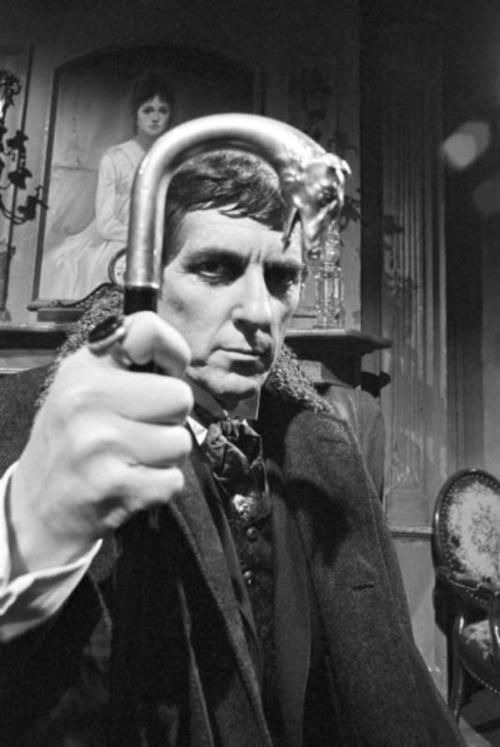
ABOVE: Johnathan Frid starred as Barnabas Collins, one of the leading characters of the original Dark Shadows television series. The influence of the series cannot be understated. In many ways Dark Shadows paved the way for the inclusion of supernatural elements in other soap operas of the 1970s and the 1980s, and was largely responsible for the explosion of romance novels featuring supernatural themes over the same time period.
While Dark Shadows was a favorite early television program for me, another show would prove not only to be a borderline obsession, but also a major influence on my career as a storyteller. Night Gallery (1969-1973) was a weekly anthology television show from Rod Serling, better known as the creator and host of the original Twilight Zone. Like Twilight Zone before it, Night Gallery was a deep and complex commentary on the human condition, but unlike its predecessor the outcomes for the characters almost always skewed towards the horrific and the truly outré. In "The Painted Mirror," an antiques dealer uses a magic painting to trap an enemy in the prehistoric past. Jack Cassidy plots to use astral projection to kill his romantic rival in "The Last Laurel" but accidentally ends up killing himself. In "Eyes" a young Stephen Spielberg directs Joan Crawford in a story about an entitled rich woman who plots to take the sight of a poor man. Week after week it delivered some of the best-written horror television of the early 1970s.
In retrospect I find it surprising that I was allowed to watch Night Gallery at all. I was very young while it was airing, and some of the content was dark and often quite shocking for its time. Nevertheless, I was so attached to the show that I'd throw a literal temper tantrum if I missed a single, solitary episode. If our family needed to go somewhere on an evening that Night Gallery was scheduled, either my parents would either have to wait until after it had aired before we left, or they'd make arrangements in advance with whomever we were visiting to make sure it was okay that I could watch Night Gallery there. I was, in a word, a fanatic.
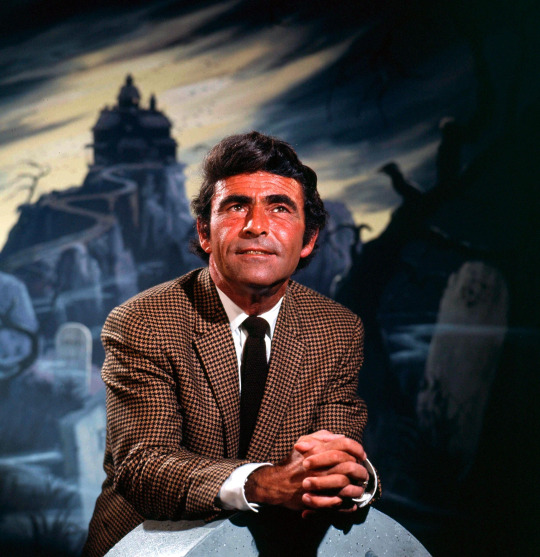
ABOVE: Every segment of Night Gallery was introduced by series creator Rod Serling standing before a painting created explicitly for the series. Director Guillermo del Toro credits Serling's series as being the most important and influential show on his own work, even more so than the more famous Twilight Zone.
7 notes
·
View notes
Text
The Disabled Tyrant’s Pet Palm Fish
Okay, legit book pitch time, because I’m doing a terrible job of coherently typing out the premise every time I try to tell a person about this book, and I cannot stop telling people about this book. Bottom line up front: The Disabled Tyrant’s Pet Palm Fish started off a little rough (a combination of everything happens so much in the story itself, and, I think, the translator finding their footing), but I’ve been having such a good time that I am deep, deep in the mtl pit, because I can’t stop reading it.
The premise! This is a transmigration novel, where our hero Li Yu (his name literally translates to ‘carp’, for the record) enters the universe of a novel he just finished. He does not enter the body of a character from the novel, he enters as... a fish. A tiny little ingredient-for-fish-soup tier fish. Before he’s totally figured out what is going on, there’s an attempt to turn him into soup, and even when he flails his way out of the person’s hands, he’s.... stolen by a cat. And then, at the very last moment, he’s saved, and placed into a bowl of water to recover. This is the part of the book where So Much Is Happening and I was genuinely stressed by fish suffering.
But once he’s safe in a bowl, he finally gets to really talk to a System, and gets given some actual instructions. Surprise, sucker! You’re in a book! And he’s tasked with changing the path of that book’s protagonist, who goes from being the fifth imperial prince to eventually being the emperor. He’s like ‘oh my god, are you serious, i’m literally a fucking fish’ and the System is like *shrug* and says that well, he can either do the mission or he can die? So he’s like ‘OKAY, COOL, LET’S CHANGE THIS PRINCE’S LIFE.’ He’s also told that if he completes enough tasks, he’ll regain the ability to become human again, which is where I was like okay, this book is maybe not going to be quite so ridiculously batshit as the summary implied. The initial mission doesn’t say anything about romance, but I was still reading it like ohohohohoho, romance!
And the original book! At first, the fifth imperial prince, Jing-wang, was nominally out of the running to take the throne, because he was born with natural mutism and the emperor was told that this might be passed down to his children. He was his mother’s only surviving child, and she died soon after his birth, so he grew up very... isolated and disconnected, which makes sense given his temperament, even before all the other factors come into play. He’s a very cold, distant man, and in the book, eventually won out over his brothers to become the emperor. A cruel, rigid tyrant of an emperor. But! He did have a husband who he loved a lot. Unfortunately, that husband was planted by his brother and sure didn’t love him. The text calls him a black lotus, and describes that relationship as ‘sadomasochistic’, which I’m not sure is quite the right word, but it sure seems... melancholy, and the relationship seems to make Li Yu sad when he thinks about it.
Now, Li Yu is very worried about how the hecc he’s going to impact this imperial prince’s life in any meaningful way, but from the very start, the people around Jing-wang see him going soft for his new pet fish. His father especially is very moved to see his son finally attached to something that way. And I want to say that even the very early bits are... unexpectedly sweet?? Jing-wang doesn’t angst about not being able to speak, which I’d been worried about (I do hear that the mutism gets fixed eventually, which i’m not wild about, but i don’t feel like he’ll ever be a super verbal person tbh), but it’s really cute seeing him figuring out to interact with a pet where not being able to speak shouldn’t even really be a factor. And especially early on, Li Yu makes an effort to be as cute as possible, and way he pets and plays with his fish is the cutest, CUTEST thing.
(li yu is given an escalating series of unbelievably lavish aquariums, but even one of his earliest ones, jing-wang notices he’s interested in a pearl and just quietly fills the aquarium with priceless gemstones for his fish to play with)
There’s something that’s very hard to articulate about this, but in an early scene, Jing-wang brings the fish with him to a stressful meeting and gets angry, and starts holding the fish in a self-soothing way, and Li Yu is like AGH, TOO TIGHT and wriggles out, but before Jing-wang can even get properly upset at being rejected by his fish, Li Yu circles back around and starts winding through his fingers. Even before romance is a factor, the physical contact and comfort were absolutely precious.
When I’d started reading this, my initial mindset was basically ‘okay, so i can see Jing-wang getting attached to his fish, but love? seriously???’, but honestly, the story handled it in a REALLY nice way. There are around 160 chapters total, and by the mid-twenties, Li Yu gains the ability to occasionally/briefly transform into a human, and by the mid-thirties, Li Yu and Jing-wang have had an extended interaction where they’re both human-shaped. And Li Yu acquires other special powers with time, including interdimensional storage space and Super Jumping Powers, and he is seriously, seriously, the most sketchy-ass fish you’ve ever seen, and Jing-wang is a smart cookie.
At first, it’s little things like ‘okay, while Jing-wang is out, I’mmmm going to explore this room!’ And he does the fish equivalent of holding his breath and hops around for a while before returning to his tank like a good little fish, but Jing-wang comes back and there’s water all over the floor and he’s like ‘..............’ So what does he do? He starts leaving teacups of water all over the floor so that his fish can stop and take a breather without worrying about getting back to his tank. And when his fish seems interested in the work he’s doing at his desk, he sets up a teacup next to where he works so that his fish can watch what he’s doing. And initially, he’s kind of like ‘this is normal fish behavior, probably’, but. Li Yu is so focking sketchy. And it really, really doesn’t take long for Jing-wang to start connecting the dots between the strange young man who periodically materializes in/near his quarters and steals his clothes and his fish.
But this story is so funny. When Jing-wang starts getting suspicious, what he eventually concludes is that oh, this is like that fairy tale about the white snake spirit who seduced a human man to steal his spiritual essence. Or the fairy tale about the fox spirit who seduced a human man to steal his essence. Okay. Awright. And he spends considerable time waiting very impatiently, wondering why isn’t my fish seducing me yet??? He even sets things up so that while Li Yu is on his desk watching him work, he starts pointedly reading erotica about the snake spirit and fox spirit, and I can tell that he’s embarrassing himself, while meanwhile, Li Yu is a modern human trying to read ancient Chinese writing, and he’s like ‘haha, lmao, he reads way faster than me, I have no idea what’s happening.’
(later on, when they’ve managed to do a little bit of communication and work things out, Jing-wang proudly tells someone (writes for someone) that the food he’s eating was made for him by his boyfriend. and when the person is like ‘ah, okay. uh. what... is a boyfriend?’ and Jing-wang is like ‘I’ve got no goddamn idea.’)
Also, you may note. That one of the tags on this story is mpreg. And that was honestly why I dove into it, I was like ‘haha, there’s no way a story like this could sell me on a plot point like THAT, go ahead, try, I double dog dare you’. Well. Last night I reached that plot point. Y’all....... it.... worked. It was still silly, but the character himself was like ‘oh my god, you can’t be serious.’ It was silly and cute. At a slightly earlier point, the emperor sends Jing-wang to take a military force and go fight bandits, so Jing-wang was planning to leave Li Yu safely at home, and Li Yu wasn’t happy and non-seriously said, ‘no, your highness, you can’t leave me behind, I’m... CARRYING YOUR CHILD.’ And he didn’t mean it, but Jing-wang wanted to believe it at first, and was really happy, and was :( when Li Yu clarified that no, physically, he’s... not capable of doing that.
Smash cut to not long later, when the System gives Li Yu his next task in the main mission line and it’s.......... babies. Li Yu tries to plead with the System that no, oh my god, I am not physically equipped for this, but also at this point? The System has straight-up modified his fish body several times. He doubled all his attributes once, not realizing this included size, and got stuck in his aquarium cave. And later on, he upgraded from minnow(?) to koi and promptly... got stuck in his aquarium cave. So they’ve already coaxed me along through believing body modifications. And then the actual fish pregnancy process was very understated and low-key, and then once the fish babies hatched, after nine months, they got the ability to turn into human babies. The story even plays around with the idea of fish babies being capable of much more independence than human babies, and the babies being Displeased with the situation. Guys, they sold me on the mpreg. How did they do that?????
And something I genuinely hadn’t expected is that the relationship takes negotiation and growth. The earliest courting scenes are very... high-handed. Which I was into! I can dig a romance novel like that, where the love interest pins the protagonist to a wall and kisses him so good he sweeps him off his feet. But Li Yu gets to be upset, and push Jing-wang away, and be angry when Jing-wang tries to wiggle around the boundaries he’s trying to establish. He gets to tell Jing-wang he feels disrespected and taken advantage of, and Jing-wang learns to back off. And when he decides that he does want to give this thing a try, he lays out a couple base rules for Jing-wang, and Jing-wang takes it so seriously that he legit hangs them on his bedroom wall.
And everyone who loves Jing-wang is so happy for him. They’re so happy for every positive development in his life. They’re happy when Jing-wang starts caring for his pet fish, and they’re even happier when he falls in love with an actual human. The main barrier to formalizing their relationship isn’t that Li Yu is a man, it’s that Jing-wang needs heirs, and well, that gets worked out. Even the emperor casually mentions that he used to have a male concubine back in the day.
You guys, I’ve been genuinely Moved by this silly novel about a fictional prince falling in love with his pet fish.
I’m not done yet, I’m almost exactly halfway through, and I’ve got no idea what’s coming next. I assume it will be political maneuvering, because Li Yu’s System told him that it’s guaranteed that Jing-wang will eventually become emperor, but the rest is up to him, and there are still a few other princes floating around who opposed him in the original book. And that black lotus husband from the original book is still around too. But Jing-wang has other allies who would have died in the original novel by now, who Li Yu managed to help save. And I’m so invested! I want to know what happens! Li Yu is periodically unlocking Jing-wang backstory reveals as rewards for completing missions, and some of these things give him a better understanding of Jing-wang in the present, but some open up brand new mysteries about Jing-wang’s past. I have to go do my actual job now, and I’m really unhappy about that, because I want! To read more!!! I’m reading the mtl right now, and if you’ve tried mtl, you know the prose can be barely comprehensible at times (i spent like ten chapters thinking jing-wang had two cousins when he has... one....) but still!!! I’m so, so invested, and I can’t stop recommending this book to everyone who has the misfortune to exist in the same space as me :’)
52 notes
·
View notes
Text
I don’t think we should be too hard on Sara for not entirely understanding her feelings for John and struggling to come to terms with them. Sara has a lot of understandable reasons for not being entirely forthcoming to John:
She’s a lot younger than John. So her maturity levels, her place in life, and her desires are not the same as his. This issue is the reason a lot of people have problems with age gap relationships to begin with. And I don’t think it should be understated how this actually DOES impact their relationship heavily. Sara cannot and should not be held to the same standards as John. She’s just STARTING her life and building a career for herself, where John has been living his life and exploring his career this whole time and is now looking to settle down and start a family. The things they want ((right now)) are not the same. In a few years Sara may feel exactly what John feels. But it’s OKAY that she doesn’t RIGHT NOW and John has to decide if he wants to wait for her, or if he wants to move on. Sara deserves the time to figure out what she wants and not be pressured into jumping into a marriage if she doesn’t even understand what that means yet.
Sara also has DEEP trauma stemming from not only her father’s suicide, but from assisting in killing him, and then being placed in an asylum for several months. She has baggage she hasn’t even begun to unpack, and it affects every aspect of her life and her relationships. Until she starts getting treatment, perhaps from Kreizler (although she may be better off seeing Karen Stratton), Sara is going to continue to have a harder time than other people navigating relationships, abandonment, anxiety and depression.
I also feel bad for John but I think John should also understand he is expecting a lot from Sara and he needs to be more patient than he’s been. His relationship with Sara will be more difficult and more delicate than his one with Violet, so it has to be one he’s willing to fight for.
Maybe Sara would have been open to a relationship, but that’s not what he asked for - he asked for a marriage. He jumped headfirst into this when Sara was still trying to figure out if she even liked him, and when he felt rejected he immediately ran off and proposed to someone else. I can’t even imagine the whiplash Sara has.
56 notes
·
View notes
Text
Psycho Analysis: Darth Vader
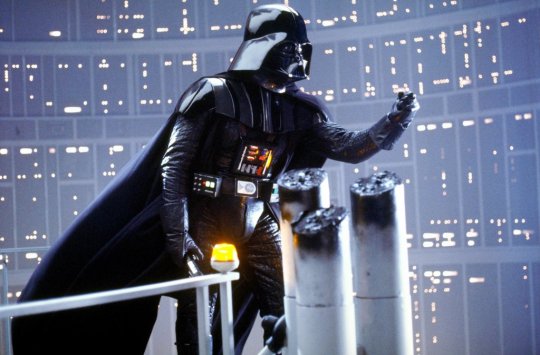
(WARNING! This analysis contains SPOILERS!)
Here he is. The big one. The world’s most famous villain of all time, and this is no exaggeration; even people with only a fleeting knowledge of Star Wars, even people who have never seen it before in their lives, probably know who Darth Vader is. The dedicated an entire trilogy to showing how he ended up this way, and an entire trilogy to defeating him, and even after he’s dead his shadow looms over the new trilogy.
It’s really not hard to see why, either; everything about him just screams cool. He’s an intergalactic dictator wizard monk cyborg with a laser sword who has a castle on a lava planet and a space station the size of the moon that blows up planets, and that’s not even getting into the fact that he has the voice of Mufasa. Darth Vader is an icon, plain and simple, and if you think his status is all surface-level, well, this will hopefully show you there’s more to him.
Actor: There are a lot of people who put in the time to bring Vader to life, but let’s just go over the most notable actors. A lot must be said of David Prowse, the man in the suit during the original trilogy; while James Earl Jones’ voice certainly did a lot of work towards making Vader as intimidating and cool as he is, Prowse’s physical presence should absolutely not be understated. He’s the one who does the movements, who walks into the scenes, he was the one physically there, and it really cannot be said enough that he is a key aspect of why the original Vader worked, even if his voice was nowhere near intimidating enough.
Jones, of course, had a voice that was intimidating enough, and while Prowse brought the physical intimidation, Jones brought the vocal brilliance. Vader’s voice is so oft-arodied and iconic, and it’s all thanks to James Earl Jones’ stellar performance. IT’s just absolutely legendary no matter which way you cut it, to the point where even when he’s portraying a freshly-christened Vader who is still in the mindset of a whiny Anakin and screaming a massive NO to the heavens, he’s still awesome.
Of course, that does bring us to Anakin Skywalker, portrayed by Hayden Christensen, and who is the most divisive actor who played Vader, albeit in his pre-cyborg form. I think a lot of the problems Christensen was criticized for while portraying Vader in the prequels was due to Lucas and his poor direction, and not due to any inherent fault on his part, as Christensen is a good actor otherwise. Case in point: any scene in Revenge of the Sith where Christensen does not have to speak and instead has to rely on giving evil glares or just looking intimidating works. I think he does a great job in Revenge of the Sith overall, and his portrayal of Anakin definitely works best in that prequel due to him really selling the frustration of his superiors not taking him seriously or trusting him, which makes his eventual slide into villainy after putting his trust in Palpatine a lot easier to swallow.
Motivation/Goals: Vader’s motivations and goals are not exactly where he shines, as it is pretty standard evil overlord stuff: he wants to crush the rebels, serve his master, and do whatever needs to be done to ensure that the power he has does not get taken away. It’s standard stuff, and even at the time it likely wasn’t a wholly original idea, but part of the reason it probably feels so generic nowadays is that so many people in every art form imaginable – books, TV, video games, and other movies – have ripped Vader off to the point where he almost appears to be a generic doomsday villain if you only look at a summary of his goals. Thankfully, this is far from the case.
Personality: Vader’s personality is where he really shines. Revenge of the Sith paints the portrait of a brilliant, talented young man who is constantly looked down upon and ignored by his peers despite his numerous successes and who is unable to openly be with the woman he loves and who carries his children due to ridiculous rules; is it any wonder he was taken advantage of by a predatory elder and groomed into a psychopath, only realizing far too late what had been done to him? This aspect of his personality has often been criticized by those who hate the prequels, but I think it is important to show that Vader was once a normal, frustrated young man who honestly had good intentions and wanted to protect others, because it helps make his eventual turn away from the Dark Side and redemption at least be a little believable.
Once he truly becomes the Vader we all know and love, he loses sight of who he was and buries himself in the Vader persona. What happened on Mustafar with Padme and Obi-Wan broke Anakin, and so he truly throws himself into the Darth Vader identity. He becomes cold, ruthless, and downright terrifying, with only brief glimpses to the cornier, kinder persona that the man who hates sandf with a passion once had, the moment where he makes a lame pun in Rogue One being the perfect example of the cheesy Anakin of the prequels shining through if only for a brief moment before Vader’s final scene in Rogue One shows that Anakin has once more been suppressed and the terrifying Vader persona is out in full force, with the real Anakin only breaking through in the end to restore balance to the Force.
Final Fate: Vader, in a final act of heroism, picks up Palpatine and tosses him down into a pit to save the life of his son Luke. Ultimately, this means that Vader fulfilled that prophecy from so long ago and restored balance to the Force, redeeming him in the eyes of his son and allowing him to become one with the Force itself and stand beside his former mentors Obi-Wan and Yoda in the final scene. It is a bit cheesy and even a little hard to swallow if you think too hard, but come on, it’s a fun space opera where good triumphs over evil and true love prevails, so just let Anakin have his little redemption.
Best Scene: The scene in which he emerges from the pitch black hallway in Rogue One and mercilessly slaughters a group of rebels with absolutely no effort, washing away decades of diminishing returns and undermining of his threat level in under a minute as the franchise reestablishes Vader as the horrifying threat he originally was.
Best Quote: Can it really be anything other than the (at the time) mind-blowing reveal he drops on Luke in The Empire Strikes Back after Luke accuses him of killing his dad? Say it with me now:
“No, I am your father.”
Some of you probably said it wrong, but I can assure you the line written above is exactly as it was said in the movie.
Final Thoughts & Score: There’s honestly no denying the level of impact Darth Vader has had; I’d say he’s up there with characters like Mickey Mouse and Mario, just an instantly identifiable character anyone off the top of their heads can name. George Lucas struck gold when he came up with this guy, that’s for sure. Is it any wonder that there are so many characters all across fiction who draw inspiration from Vader?
Vader stands tall as one of the greatest creations in pop culture, and though characters that copy him tend to offer diminishing returns – with a few notable exceptions, of course – he definitely is a wonderful source of inspiration, especially when it comes to designing a character who is still interesting and absorbing despite having seemingly simple, cliched motives. And while it is true Vader comes off as a bit cliched these days because he pretty much wrote the book on a lot of the cliches attributed to him and his ripoffs, my point still stands, because even in modern times you’d be hard pressed to hear anyone call Vader a poor villain despite his main goal basically being “kill rebels.”
Vader is a rare breed, and so deserves a rare score. He is the only villain as of now I think truly deserves an 11/10. He is the villain other villains wish they could be. He is the most striking character in the entire cast. He’s so downright cool, is it any wonder his own grandson decided to emulate him by becoming his biggest fanboy?
While Vader does ultimately redeem himself in the end, it serves as a culmination of one of the most profoundly tragic character arcs in cinema, as a wide-eyed idealistic boy full of love, hope, and a sense of righteousness is slowly and surely broken down by the world around him and the very heroes he idolized to the point where he is preyed upon by a predatory authority figure who whispers everything he wants to hear in his ear and offers him something he never got before: respect… and then from there, his life spirals downward ever further, until he ends up being utterly consumed by hatred as he burns alive on an alien planet before the man he considered a friend and a brother, the knowledge that his wife feared him in his mind as he was fried to a crisp; and when he is finally brought back as a cyborg, his first moments awake again are shaken by the revelation his wife is now dead, and he is responsible. And then from his lowest point, we see Vader climb again into the light, extremely slowly, until that final choice he makes where he can either do the right thing as he was always meant to or continue subjugating the galaxy that beat him down and abused him.
The fact he chose to be good in the end despite everything in his life prior, despite all of the crimes he committed, really makes him a far more interesting character than if he had been straight-up evil to the core. Instead, he is the ultimate darkly tragic fallen hero given one last shot of redemption in the arms of death. It’s beautiful in the cheesy, dramatic way only Star Wars can be, and I think that more than anything is why Vader has endured as a cultural icon, because at his core he is everything beautiful, tragic, and cheesy about Star Wars rolled into one awesome, black-clad Sith Lord.
42 notes
·
View notes
Text
Steve Jenkins Named 2023 Harry Statham Coach of Impact Award Winner
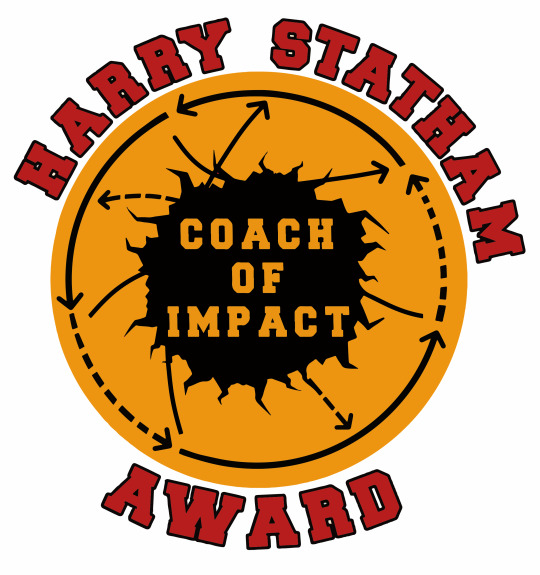
FOR IMMEDIATE RELEASE April 5, 2023 Media Contact: Matt Ankenbrandt Sports Information Director │ Small College Basketball 616.780.1335 www.smallcollegebasketball.com
Steve Jenkins Named 2023 Harry Statham Coach of Impact Award Winner Kansas City, MO – Small College Basketball is excited to announce Steve Jenkins of Evangel University, as the 2023 Harry Statham Coach of Impact Award winner. Coach Jenkins is the fourth recipient of the prestigious Harry Statham Coach of Impact Award. Harry Statham had this to say about Coach Jenkins:
“Coach Jenkins was an outstanding athlete in basketball, baseball and golf at Evangel and become a tremendous coach an role model for his athletes,” stated Statham. “He personified unselfishness, loyalty and hard work.”
Coach Jenkins led the Evangel University Crusaders for 39 years, retiring after the 2020-21 season. During his decorated career he compiled a record of 692-542, which ranked fourth among active NAIA men’s basketball coaches at the time of his retirement and 21st on the organizations all-time wins list. Coach Jenkins had this to say about being named the 2023 Harry Statham Coach of Impact Award winner:
“How can you be a “Coach of Impact” without belonging to a fraternity of coaches who have impacted your life, leading the way inspiring and pushing you to somehow not only beat them but be like them,” stated Jenkins. “From day one of my collegiate coaching career Harry Statham has been such an inspiration to me. I’ve looked up to Harry as a brother would longingly look up to his big brother wanting to beat him as much as he loved him.”
Coach Jenkins started his career at Evangel as a student-athlete. During his collegiate career, Coach Jenkins earned four baseball and three basketball letters. He graduated with a Bachelor of Arts degree in psychology and physical education and later went on to earn a Master’s Degree from the University of South Florida.
Coach Jenkins started his coaching career at Evangel Christian School in Lakeland, FL from 1974-76, he not only coached basketball, but also baseball. He then returned to his alma mater as an Assistant Coach in 1977, before taking over as the Head Coach before the 1982-83 season. Evangel Athletic Director Dr. Dennis McDonald had this to say about Coach Jenkins:
“As great of a coach as Steve Jenkins is, he is an even better Christian man, husband, father and grandfather,” stated McDonald. “He truly is a great man. That is what led to his enormous success as a coach. We should all follow his example of leadership and put faith, family and community ahead of our job as coaches. Steve is very deserving of all the awards he has received in his many years of dedicated service to people and he is very deserving of the Harry Statham Coach of Impact Award. The impact that Steve Jenkins made not only at Evangel, but in the Springfield community cannot be understated.”
Coach Jenkins led the Crusaders to seven Heart of America Athletic Conference Championships and 13 NAIA national tournament appearances. He was named the Heart Coach of the Year seven times and was named the NAIA Coach of the Year in 2002 after leading the Crusaders to the NAIA Division II National Championship. During the historic 2002 season Evangel finished with a record of 35-1, including a undefeated 20-0 conference record. En route to the National Championship, the Crusaders went wire to wire as the number one ranked team in the country and won their second Heart Tournament championship.
In 2014, Coach Jenkins was inducted into the NAIA Hall of Fame, becoming just the second Evangel recipient of the award. Coach Jenkins is also a member of the Evangel Athletics Hall of Fame. Furthermore, Coach Jenkins was inducted into the Missouri Basketball Coaches Association Hall of Fame in 2013 and the Springfield Area Sports Hall of Fame in 2011. Coach Jenkins added this about the award:
“This honor comes at a time in my life when memories are fading daily but the love and respect that Harry and I have for each other is as strong as ever and will never fade,” mentioned Jenkins. “We can only pray that our profession keeps the life values we have learned from each other and passed along to our student-athletes in order to equip the next generation of have a impactful life.”
Coach Jenkins mentored six different players on their way to the Heart Player of the Year, along with two Freshman of the Year, four Newcomer of the Year and one Defensive Player of the Year. Thirty-three players were named NAIA All – American, including ten after NAIA Division II was eliminated.
Jenkins also coached the Evangel baseball team from 1978-1983, finishing with a record of 132-97- 3. He also guided the Evangel’s men’s golf team, being named Heart Coach of the Year in 2010 and 2012 and led the Crusaders to their first conference championship in 2012.
The purpose of the Harry Statham Coach of Impact Award is to honor a Coach that has used the power of the coaching platform to make a positive impact on players, coaches, and others. The Coach will be a person of high character and integrity who has served as an excellent role model, and who has deeply impacted the lives of others.
The annual winner of the Harry Statham Coach of Impact Award must have coached at the small college level for a majority of his career, and must have a high degree of personal character and integrity. The Coach may be a current or former Coach, and Small College Basketball will honor a living Coach with this award annually. In 2019 Bob Burchard, former Athletic Director and Head Men’s Basketball Coach at Columbia (MO), was named the inaugural award winner. Concordia’s Ken Ammann was named as the winner in 2020, and there was no winner in 2021 due to the Covid-19 pandemic. Steve Ridder of Embry-Riddle Aeronautical was named the winner in 2022.
The award is named after Harry Statham, former Head Basketball Coach at McKendree University. Coach Statham is a member of the National Association of Intercollegiate Athletics (NAIA) Basketball Hall of Fame. Upon the conclusion of his 52-year career at McKendree, Coach Statham’s 1,122 wins were the most by any men’s or women’s coach at a four-year college or university in the United States The only other coaches at a four-year institution with 1,000 wins are Pat Summitt, Danny Miles, Mike Krzyzewski, Herb Magee, Dave Holmquist, Tara VanDerveer, Geno Auriemma and Sylvia Hatchell.
To nominate a candidate for the award, please send detailed information about the coach, along with examples of how the Coach has impacted the lives of others, to [email protected].
To stay up to date on all things Small College Basketball, please head to smallcollegebasketball.com.
0 notes
Text
An Introduction to Louis Pasteur – The Father of Microbiology
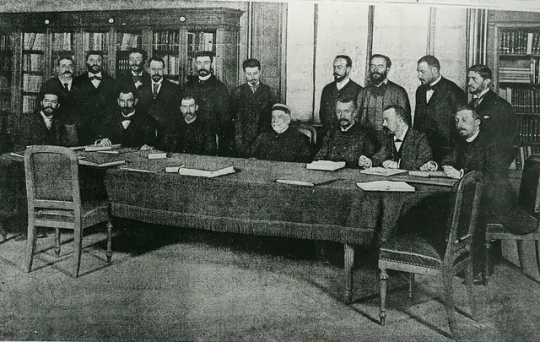
Louis Pasteur was one of the most influential scientists in history. He made incredible contributions to science and medicine, changing our understanding of the microbial world and paving the way for revolutionary medical treatments and public health initiatives. If you would like to learn more about this great scientist, keep reading!
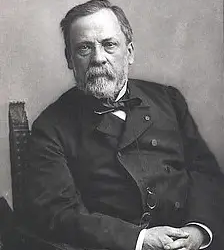
Louis Pasteur portait 1822-1895. Photo by Euclid vanderKroew. Flickr.
Who Was Louis Pasteur?
Louis Pasteur was born on December 27, 1822, in Dole, France. His parents were Jeanne Etiennette Roqui and Jean Joseph Pasteur (Tanner who worked with hides). Dispite being dyslexic and dysgraphic his early education focused on chemistry and physics. He would later become one of the most important microbiologists in history. In his lifetime, he made tremendous contributions to science ranging from discoveries related to fermentation and pasteurization to advancements in medicine and public health. His research revolutionized our understanding of microorganisms and disproved theories popular at the time about a spontaneous generation - the idea that microbes could arise from non-living matter.
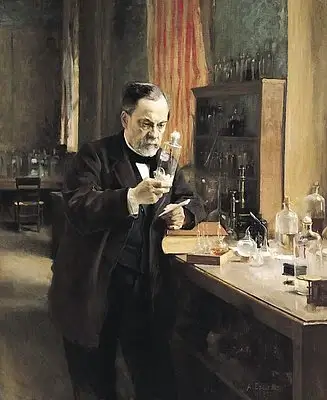
Louis Pasteur in his laboritory. Photo by Sanofi Pasteur. Flickr.
What Did He Discover?
Pasteur’s major breakthroughs included demonstrating that fermentation is caused by microorganisms, discovering pasteurization as a way to prevent spoilage of milk and wine, and developing vaccines for rabies and anthrax. These discoveries had far-reaching implications for advancing healthcare globally as well as improving food safety standards everywhere. For instance, Pasteur's work on pasteurization has been credited with saving many lives by helping reduce contamination in food products such as milk, beer, juice, cheese, and many more items. In addition, his development of vaccines helped make infections like rabies much less deadly than they once were.

Human rabies immunoglobin vaccine and packaging. Photo by Institut Mérieux. British Science Museum.
How Did He Change The World?
Put simply, Louis Pasteur changed the world with his microbiology research. His discoveries led to major advances in healthcare that continue to benefit people today from reducing contamination of food products through pasteurization to preventing infectious diseases through vaccinations. Moreover, his work inspired generations of scientists after him who continued making groundbreaking advances in medicine & public health based on what he started over a century ago!
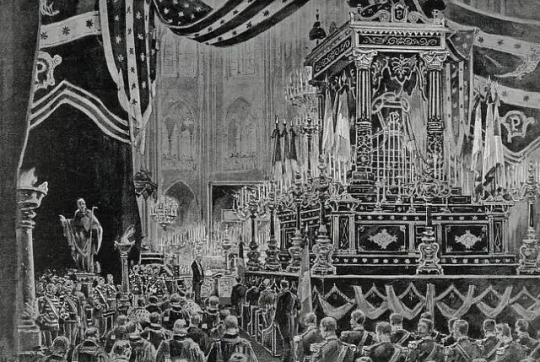
State funeral of Louis Pasteur at Notre Dame Cathedral in Paris. Lithograph by C. Hentschel, ca. 1895.
Final Years
During his lifetime, Pasteur worked tirelessly to develop revolutionary treatments and methods that remain highly influential today. In the final years of his life, Louis Pasteur continued to achieve incredible feats. In 1895 he discovered a vaccine for rabies, which remains an effective treatment today. His accomplishments were recognized by various awards, including the Legion of Honor from Emperor Napoleon III in 1853 and numerous honorary degrees from universities around Europe. After Pasteur’s death in 1895 at age 72, millions of people around the world paid tribute to him as one of history’s most important scientists.
Conclusion
Louis Pasteur was an incredible scientist whose impact cannot be understated — from his discovery of fermenting agents causing disease & spoilage through vaccine development for diseases like rabies & anthrax! His legacy continues today with countless lives saved due to improved food safety standards & reduced risk from infectious illnesses around the globe! If you’re interested in learning more about this extraordinary scientist & his accomplishments then we recommend taking a look at some additional resources online or even checking out some books written about him! Thanks for joining us on a brief introduction to Louis Pasteur – The Father of Microbiology! Sources: THX News & Wikipedia. Read the full article
0 notes
Photo
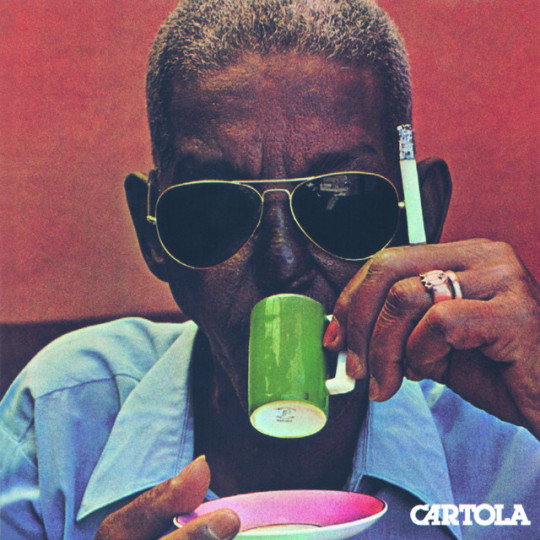
Cartola - Verde Que Te Quiero Rosa [1977]
Photography: Ivan Klingen. Art Direction: Ney Tavora.
It’s wild to think about how much of the culture around Music history highlights European classical music as the pinnacle of performance, considering how half a world away, an increasingly exciting musical tradition was being defined simultaneously.
Across the middle passage, enslaved people were targets of systemic cultural erasure, separating groups with common languages and ancestry, banning drums and generally disencouraging the concept of a black tradition through brutally violent means.
Nevertheless, Black communities in the so-called new world are rife with the traditions of our ancestors, their rhythms live on in the music that fills our streets, moulting and morphing into new evolutions of the same vibrations that carried us thus far, and carry us still.
Having lost all else, Enslaved people ensured their legacy would be indomitable and inimitable by passing on their culture, entrusting their descendants would carry it to the fullest extent. No better example exists of this than Cartola, a Brazilian sambista who was one of the pioneers of the genre, responsible for the dirty work of ensuring samba deserved the respect that evaded it for so long.
Angenor Da Oliveira grew up in Mangueira, an up-and-coming favela in the outskirts of Rio de Janeiro, working from the age of 15 in any and every job available to support his passion, Love, Music, and Drinking, commonplace values of the Bohemian lifestyle that brings Samba to life. His commitment to this lifestyle left him living on the street at age 18, after being thrown out by his father, who, like many Brazilians at the time, looked down upon the genre and the malandragem that surrounded it.
This scene, replete with people who find and use any advantage in every situation, was where Cartola met his musical partner and lifelong friend Carlos Cachaca. Them and a few other musicians founded the Primera Estacao Samba School, where they took Samba from being “Low-Value music” to becoming a staple at every carnaval and parade both across the country by the 1940’s, and subsequently creating the cultural backdrop for the emergence of Bossa Nova in the following decades.
However, thanks to dwindling financial success, a few failed friendships, a long illness for cartola and a short one that took his first wife; Cartola found himself ousted from the Samba scene he helped create a few years before, until an unlikely romance reignited his passion for life and music, opening a bar in Mangueira with the love of his life, Dona Zica. This establishment, aptly named Zicartola, became the centre of Samba in the 1950’s and introduced Cartola to musicians who were a generation ahead of his, transcending a genre he helped to create.
Better late than never, Cartola began recording his own music in 1974, at age 66. Like a fine wine, his music brims with an authenticity and emotion that cannot be understated, and you can feel the life he’s lived and the impact it has had on all of us through the music. The portrait presented in his 1977 album Verde Que Te Quiero Rosa is particularly emblematic of his relevance, with the iconic green cup and pink saucer, the traditional colors of Mangueira and heavily featured by Cartola in his life. Poetic and Prophetic, This portrait is best summed up with the lyrics from “Pranto de Poeta”
“Em Mangueira Quando morre
Um poeta Todos choram
Vivo tranquilo em Mangueira porque
Sei que alguém há de chorar quando eu morrer”
1 note
·
View note
Text
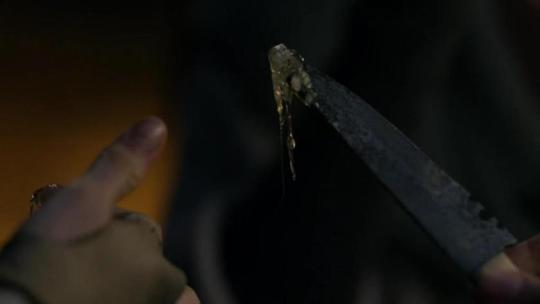
I signed up for a Diana Gabaldon talk and book signing in Fairfax, Virginia well before Outlander Starz was a thing. It was a sold out event and the one and only time I ever stood in line to meet someone famous. Worried about my navigating (and rightfully so) D.C. traffic, my husband drove me five and a half hours for an event he didn’t have a ticket for. Unbeknownst to him, I had put him on the waiting list and he got in!!!! He was thrilled (hard eye roll here)!!!! As it was our first time at such an event, we didn’t know what to expect and were a little shocked to see a line into the auditorium that wrapped itself through and around a very large campus building. I was walking with a cane at the time and crestfallen, I knew I would not be able to stand in line. My big burly manly man of a husband breached the crowds of plaid clad women to secure us a place while I sat feeling guilty in a chair. It remains one of the nicest things he has ever done for me. Listening to Diana speak and meeting her in person was a surreal ordeal, but well worth everything we went through. As great as it was to meet her and despite my love for the actors on the show, I can’t see myself waiting outside or inside a venue for the hours it seems to take to meet them. However, …I swear I would for Matt B. Roberts, LOL!
What can I say? I’m a fan of writing and Outlander and he is my favorite Outlander script writer. I feel like I “get” him and the way he thinks. Well. at least about Outlander. No, …I really DO get how he thinks BECAUSE of Outlander. I have learned that not everything a writer wants to be said or happen on a show comes to fruition. There are a lot of voices and logistics influencing the final product. However, it is obvious to me what are Matt’s focuses and influences when I see an episode he has written. In my humble opinion, he truly understands why this story and its characters are special. He sees through to the heart of what is happening. He gets what the story is saying about people, life, love, and family. That he is able to translate that visually continues to be a wonder to me. Case in point? Outlander episode 4.9 “The Birds and the Bees”.
I recently republished a blog post in honor of the 4.9 episode. I wrote about how I have grown to appreciate Diana’s imaginings of the first meeting of Jamie and his adult daughter. In that article, I point out how the expectations of that moment would have to have been unrealistic. The import placed on this meeting cannot be understated for either the characters or the fandom. I remember the first time I read it, I was a bit disappointed. I think I was expecting some equivalent of colonial fireworks. Diana didn’t give me or Brianna what we expected instead she gave us what we …needed. I found myself measuring this episode against that standard. Did Matt B. Roberts and writing partner Toni Graphia give us what we expected or what we needed?
We Needed to See Their Faces
I’m starting to appreciate how important it is for actors to emote. Not everything can be communicated in dialogue nor should it be in a visual medium. We sometimes need to see what a character is feeling and I felt their were some really important feelings revealed in this episode. Lizzie, Ian, Murtagh, Roger and all three Frasers told us volumes with a mere expression.
I found myself really looking at Roger’s face in this scene. At first he seems just irritated that he still has to deal with Bonnet. He doesn’t have time to deal with this piece of shit. He needs to find Brianna. When the reality of what the Captain is saying, he will be sailing to Philadelphia, starts to sink in you can see the resignation. I’m not sure why, but I felt like Roger’s expression was slightly sardonic. Of course he isn’t done with Bonnet, of course he is about to get pulled away from Brianna before he can tell her he hasn’t left. This is no idle threat. He is well and truly screwed. However, he cannot show too much emotion. You don’t want to give this monster any clues as to how you are feeling and give him any ammunition. How ironic that the one person he is desperate to protect from Bonnet is already his victim. His “especially when it comes to women” line made me cringe. I think uttering “poor Roger” under my breath is about to become a regular thing.
Brianna. Within the span of a few minutes we see her face reveal what has to be the entire span of human emotion. I felt emotionally exhausted just watching her swing from grief to hope and back again.
I’m not sure I need to comment. These faces speak for themselves.
We Needed to Know Roger Didn’t Leave
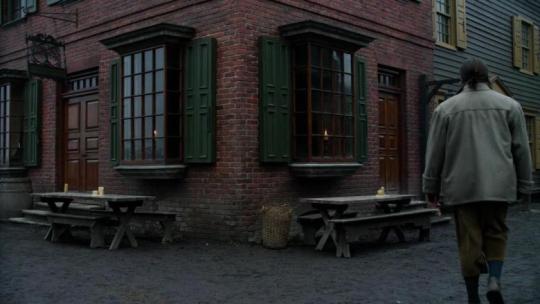
There were some pretty big departures from the book in the last few episodes and I have learned (not easily mind you) to be patient. Episodic TV can try that patience when you have to wait a whole week to get answers and everyone in the fandom is speculating and spouting disappointment. There are some things I still need to know about Roger and his storyline, but the biggest thing I needed to know was if he actually left. I needed to know he didn’t. I needed to know that it was just an argument fueled by some really piss poor communication, but that it was just an argument and not an abandonment. Nothing more happened than what has happened in my own and many other’s relationships. People got angry and said stuff they really didn’t mean out of hurt and stubborn pride. I needed to see when Roger did leave it wasn’t his choice. I knew when he left with Bonnet, he was coming back.
We Needed This Scene, This Exact Scene
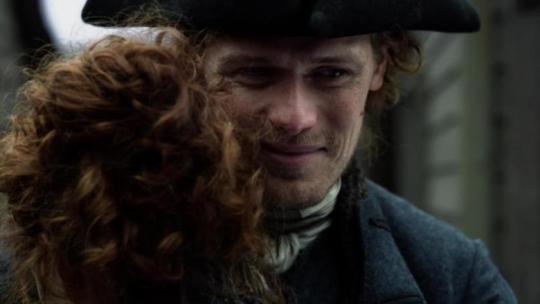
Jamie meets the child he sacrificed all for. The child he never thought to see. Like all important moments like this, reality is never quite as we expected. Nothing is ever as good or as bad as we might think. Brianna only knows what she has been told about her “father” Jamie. He had to seem the stuff of legend and fairy tales to her. Her first view of her father was of him relieving himself. That very human reality took him very quickly from fairytale hero to just a man. It was what exactly what she needed. Her expectations needed this adjustment. I was thrilled to see they kept this part of the book! Well, maybe not actually thrilled, maybe a bit uncomfortable, but you get the point. She rounded that corner looking for someone bigger than life and found a man, a man whose arms were safe place to rest.
In my blog, I point out that Brianna learned more about her father in the few minutes he didn’t know who she was than in all the stories she could have been told about him. We know fans can often loudly complain about any changes from the book. There were changes to this scene, but none that greatly affected its impact. Brianna learns that her father is loyal, firm, but kind and most importantly that he loves her. It was so very close to how Diana imagined it. Creating that visual representation of her imaginings was definitely made easier by actors who seem to inhabit their characters. Sam Heughan was absolutely amazing. Sophie Skelton played Bree’s excitement and trepidation to perfection. When she fell into Jamie’s arms all felt right with the world.
We Needed Our Mothers
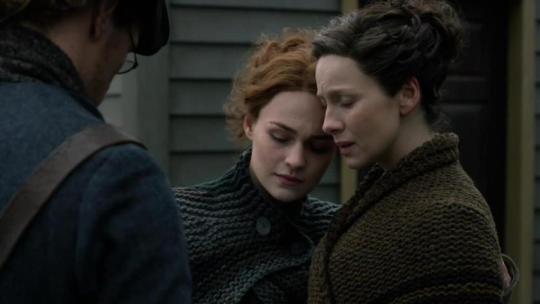
I still struggle with Claire’s decision to leave her daughter in the future. I appreciate that the show allowed Claire to show us she still struggled with that decision. Although she seemed shocked and overjoyed to see Bree, I had the sense that she was also dismayed. The past is a dangerous place for a woman and I was struck by all that happened because Bree needed her mother. I would find it difficult to reconcile all that loss and wondered at how it would affect Claire’s relationship with Jamie. Bree is obviously struggling and Claire can see it, but she also knows that Bree is a woman now and as such can no longer be compelled as a child to tell her what is going on. However, Brianna needs her mother maybe more than she ever has. She needs her mother to draw her out and comfort her. We needed to see that happen.
We Needed To Feel Our Way
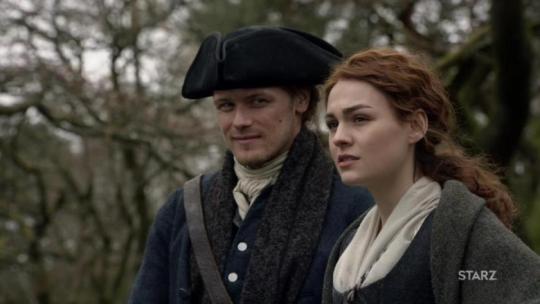
I love that this show takes its time with people. The tender and tentative dance between Bree and Jamie was needed. They are virtual strangers. Strangers who want and hope and long and need to find a way to a come together and build a relationship. We needed to see them tiptoe around Frank. We needed to hear Jamie’s gratitude towards Frank and Bree’s guilty feelings about wanting to be with Jamie. We needed to see Jamie’s avid attentiveness to Bree’s every move and his constant furtive glances and smiles. We needed childhood stories, working together on the ridge, and time around the table family.
We Needed to See That Bree Understood
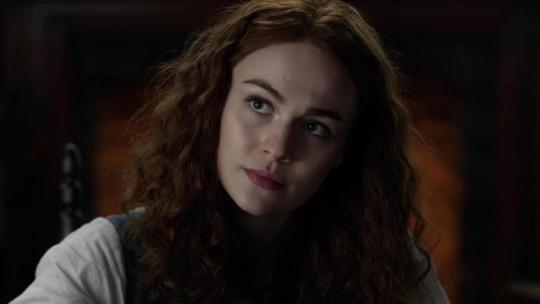
While it was obvious that Jamie was studying Bree. It wasn’t quite as obvious that she was studying him and maybe more importantly, she was studying Jamie with Claire. Bree telling Claire about Franks’s knowing she came back to Jamie was unexpected. The sadness with which this news was received gave me lump in my throat. I felt for all of well-intentioned choices and unintentional pain in Claire’s marriage to Frank. I’m not sure what Claire was supposed to do with that knowledge except feel guilt and regret, but Bree’s acknowledging she understood why Claire had to return was also unexpected and a…gift.
We Needed to Share Our Feelings
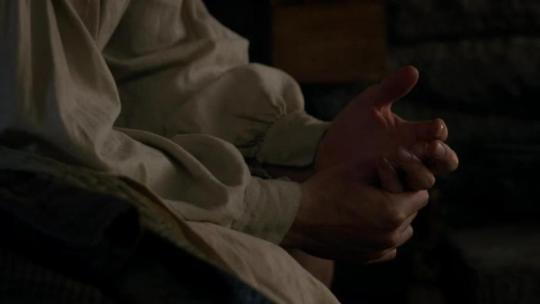
The quiet conversations between Jamie and Claire were everything. I get another lump in my throat just thinking about them. Jamie sitting on the edge of the bed rubbing his aching hand, a reminder to us that he too suffered what he does not yet know Brianna suffered. It reminds us that he has known so much pain and loss in his life and Brianna’s return is an unforseen and never dreamed of reality that he doesn’t want to end. He is human after all and a father wants his child to stay. Jamie’s openness and vulnerability with Claire is one of the main reasons this couple holds a special place in my heart. He is able to share his fears and regrets and his joys with her and know she does not judge him. In her arms, he safe to be himself without fear. In return, we know that he constantly thinks of her and a large part of his joy in Brianna’s return is because he knows Claire misses her so much. His joy in Claire’s return to him has to be constantly colored by her leaving Bree. This child was the impetus for all the sacrifice and the 20 years of loneliness. Their constant touching and silent looks communicate their gratitude for all they have. But, I also feel each touch acknowledges the weight of all they have lost. They have Bree now, but they lost 20 years together with her.
We Needed Something to be Simple
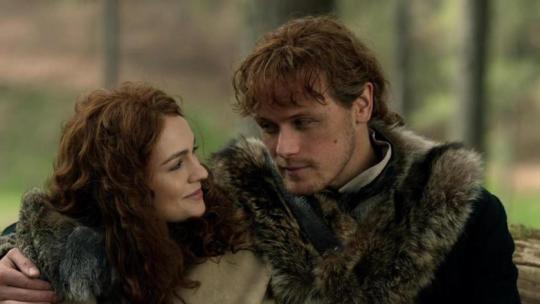
In the end, Bree’s pregnancy, Claire’s promise, Lizzie’s mistaken assumptions, Jamie’s parental protective instincts, will result in complications that will change everything for everyone and I can’t say I’m looking forward to witnessing what happens. And so, I’m grateful that Matt and Toni gave us something else we needed. The gave us something simple. They gave us birds, and bees and a name Jamie has longed to hear …Da.
A sweetness that cuts…a reflection on Outlander episode 4.9 “Birds and the Bees I signed up for a Diana Gabaldon talk and book signing in Fairfax, Virginia well before…
1 note
·
View note
Text
Transcendence in the Sleepless Streets of New York City
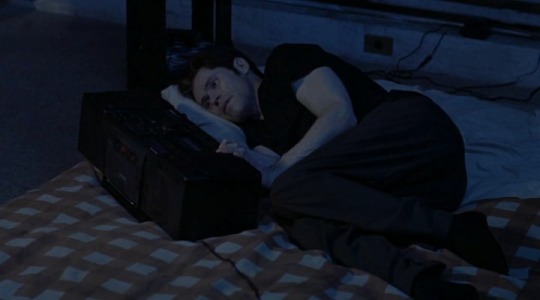
Light sleep denotes the state of non-REM sleep where the person has not yet fallen into heavy sleep from whose lull it is more laborious to arise and which thus provides one with real rest rather than shallow slumber. It is appropriate that Paul Schrader, the American poet of modern sleepwalkers in urban spaces, would title his most personal film as Light Sleeper (1992). To call Schrader’s heroes sleepwalkers is a little misleading, however, since his characters aren’t really asleep; they are constantly awake but in a drowsy, quasi-delirious state. They are never totally asleep nor totally awake. They lie in between of the bed and the street. They exist in stasis like the characters in Robert Bresson’s films, which Schrader admires immensely.
The lethargic protagonist of Schrader’s Light Sleeper is a man named John LeTour, played by Willem Dafoe, an ex-drug-addict and current drug dealer who is re-evaluating his profession as his boss, played by Susan Sarandon, is planning a career change by starting up her own cosmetics business. In these times of change, LeTour comes across an old love from the past, Marianne Jost, a woman who has been straight and out of the drug business for several years. A tragedy in Marianne’s family leads her back to drugs and finally to death, which sets LeTour on a mission of senseless violence against those who he believes are responsible for Marianne’s death. In jail, awaiting his sentence of many years, LeTour reconnects with his boss, reflecting on the strangeness of his path like Michel in Bresson’s Pickpocket (1959).
Given this chain of fictive events, Light Sleeper ties in most obviously not only with Scorsese’s Taxi Driver (1976), which Schrader wrote, but also, and more importantly, with Schrader’s earlier films Hardcore (1979) and American Gigolo (1980). All of these films portray a man’s journey in the urban underworld, culminating with an act of violence. Hardcore is perhaps the farthest away from the formula since it portrays a father who goes to rescue his missing daughter from the porn industry, while Taxi Driver comes across as the clearest parallel work as a subjectivistic depiction of a lonely man who redeems himself through a purification via violence. Yet it is really American Gigolo which is the closest in spirit to Light Sleeper (though it lacks the extreme violence of Light Sleeper and Taxi Driver; it culminates with an accidental act of violence).
This seems more than appropriate because Taxi Driver is, after all, a film by Scorsese whose vision overrides that of Schrader. Taxi Driver famously ends with an open epilogue sequence which can be interpreted in many ways, but is probably best grasped as a delirious death dream in which the protagonist finds spiritual solace after his self-destructive burst of hatred toward others. American Gigolo and Light Sleeper, on the other hand, end with sequences which are clearly rooted in reality in the sense that they leave no possibilities to interpret themselves as dreams or other such detachments from the established diegetic world. They conclude with a serene return to tranquility after the burst of violence. They show their protagonists in prison where they are visited by a woman in whose presence they are touched by something transcendent -- not necessarily something divine in the theological sense, but something external and non-private in the metaphysical sense; that is, they are touched by a dimension of sense and meaning beyond their lonely isolation.
It is not a happy ending in the most conventional sense of the term since it merely uncovers the manifestation of a vague promise of something better. The endings of both American Gigolo and Light Sleeper pay homage to Bresson’s Pickpocket which ends with Michel finding an ambiguous sense of purpose as Jeanne, a young woman living near him and the only person who seems to have the smallest ounce of care for his sake, keeps on visiting him in prison. American Gigolo goes the whole nine yards with the homage by imitating the restraint acting, ascetic mise-en-scène, and minimalist editing (with mechanic fades to black closing each brief scene, depicting the flow of time between the visits between the man and the woman), whereas Light Sleeper condenses the essence of the encounter into one single scene with an acting style more established in the whole of the film. The homage is most apparent, of course, in the final lines of the films. Bresson’s film ends with Michel saying: “Oh, Jeanne, pour aller jusqu’à toi, quel drôle de chemin il m’a fallu prendre” (”Oh, Jeanne, what strange path I had to take to come to you”). American Gigolo concludes with Julian saying: “My God, Michele, it has taken me so long to come to you.” Light Sleeper turns it around by having the woman, LeTour’s boss played by Sarandon, simply say: “Strange how things work.”
Some might accuse of Schrader not only for copying but also for repeating and thus just doing the same thing over and over again. The way I see it, however, is that the filtered ending, which always changes a little, keeps gaining new meanings, and at the point of Light Sleeper it has become even more touching than in American Gigolo. It is heavy with significance and emotional baggage; yet it never feels semantically heavy in the sense that it called for any decoding or interpretation. It has a great balance between heaviness and lightness. The heavy prison bars of Pickpocket and the sterile glass separating the lovers in American Gigolo have vanished in Light Sleeper, and there is only an institutional barrier in the air between the two, which cannot come in between their emotional reunion, exemplifying the transcendental manifestation.
In order to appreciate the impact of the ending one should keep the rest of the film in mind, too. For its understated optimism and serenity are paralleled by preceding aesthetics of death, violence, and misery. Schrader’s style in Light Sleeper is probably easiest to grasp by thinking of it as neo-noir. Neon lights illuminating interior spaces from an outer source, seedy streets with paper trash, and run-down apartments of New York City characterize its concrete sense of milieu. In homage to genre tradition, Schrader even has a voice-over of LeTour reading his diary entries. Although this device is never overused to the extent where it would turn the film into pastiche, it certainly feels loose and unnecessary -- an unattached reminder of Taxi Driver.
The awkwardness of the voice-over goes together with the other weaknesses of the film. Schrader’s narrative fumbles at times without a clear sense of where it is heading (there is, for one, “a sub-plot” of a park murder case which is mentioned twice in the film but then goes nowhere) and his style is less than consistent in terms of acting, editing, and music (which is further emphasized by the connection to Bresson, the master of stylistic consistency). At the same time, however, these are difficult to be taken solely as weaknesses since they seem to enhance the overall impact of the film. There is something similar in Schrader’s narrative looseness to the films of Wim Wenders, Jim Jarmusch, and Alan Rudolph in the 70′s and the 80′s. The overall impact of Schrader’s style is a cinematic articulation of a certain mode of being in the world, a lethargic, fatigued, and intermittent being, an existential narcolepsy, light being on the surface of the world.
Without going into a detailed stylistic analysis, it could be stated that Schrader achieves this impact by an execution which finds balance between realism and stylization. In a word, the idealist, transcendent ending (which, however, never loses its touch with reality) of the film is preceded by big piles of dirt. As an aesthetic synopsis of his earlier films and as an anticipation of the ending of the one in question, Schrader begins Light Sleeper with a slow low-angle dolly shot of a run-down, dirty asphalt street. The shot concludes with a slow dissolve from the surface of the street into a medium shot of the perplexed protagonist. The street is a tainted mirror of the character’s soul like in the best works of Buñuel. This dissolve, this cut, this double image is a perfect metaphor for Schrader’s style as a whole in this spectacular film. When the camera tracks toward LeTour’s face in the final shot, framing his face in a tight extreme close-up, his aged, tired face bears a resemblance to the worn asphalt of the street, the world which he cannot shake off from him.
In terms of neo-noir, Light Sleeper can also be seen as another tale of the burden of the past. LeTour must carry his burden everyday as he walks the streets of drug dealing. Marianne must carry it too, and the burden eventually becomes too heavy for her. Yet it seems that Schrader is less interested in the psychological ramifications of this burden than in the overall theme it connotes: the existential imprisonment of man, which Bresson brought to the attention of the cinema. Like Michel in Pickpocket, LeTour is more imprisoned outside than inside the prison. He lives a life of constant fatigue and insomnia which he has acquired in exchange for losing his drug addiction. When he sleeps, he is a light sleeper who never gets real rest. When he is awake, he is a light being who can never really be. His lonely isolation is reflected by the emptiness of his ascetic apartment -- whose emotional core is encapsulated in the stereo playing LeTour’s ex-lover’s name on repeat (”Marianne Jost, Marianne Jost, Marianne Jost”) -- next to which there is a gulf of garbage awaiting LeTour’s soul as in the grim ending of Buñuel’s Los Olvidados. Like Michel, LeTour finally redeems himself, and, paradoxically, attains abstract freedom through concrete imprisonment. Strange how things work.
Schrader is a great admirer of the mechanic stasis of Bresson’s endings, and he has never come closer to their artistic quality than in Light Sleeper (though detached from Bresson’s absolute purity and mastery, the film also transcends mere imitation). While American Gigolo imitates Pickpocket more closely, Light Sleeper seems to enrich its homage with uniqueness. The former work was exercise for the latter. Of Bresson’s endings Schrader writes:
Stasis is the quiescent, frozen, or hieratic scene which succeeds the decisive action and closes the film. It is a still re-view of the external world intended to suggest the oneness of all things. In Diary of a Country Priest it is the shadow of the cross, in A Man Escaped it is the long shot of the darkened street with Fontaine and Jost receding in the distance, in Pickpocket it is Michel’s imprisoned face, in The Trial of Joan of Arc it is the charred stump of the stake.
This static view represents the ‘new’ world in which the spiritual and the physical can coexist, still in tension and unresolved, but as a part of a larger scheme in which all phenomena are more or less expressive of a larger reality -- the Transcendent. [1]
It is more than evident that the ending of Light Sleeper is Schrader’s attempt to articulate precisely “the oneness of all things” or “the ‘new’ world in which the spiritual and the physical can coexist.” Though still in tension, their phenomena (say, thought and emotion on the one hand, objects and states of affairs on the other) express the underlying unity. Closing his eyes and silently reflecting on the strangeness of his path, LeTour experiences a touch by the transcendence, an external dimension of value, sense, and meaning. Neither Bresson nor Schrader are interested in making metaphysical claims for the existence or non-existence of such a dimension. That work will be left for the metaphysicians and the meta-ethicists. As artists, Bresson and Schrader are interested in the human experience of this transcendence. The experience of its presence on the surface of the world. The unity of the real and the irreal, or the concrete and the abstract, in experience is why Schrader’s style never departs from l’éffet de réel and the abundance of observational data characteristic for the cinema. As the camera closes in on LeTour’s face as he closes his eyes and presses his mouth against his boss’ hand, the vicinity of the camera allows the image to register slight movement of LeTour’s eyes beneath his eyelids, implying his entrance into real rest from the prison of light sleep. This subtle bodily movement is neither solely physical (in terms of simple movement of a physical object) nor solely spiritual (in terms of mere expression of emotion or thought without a physical correspondent). It is both. The registered movement on the surface of the world, captured on the surface of the cinematic image, is Schrader’s final word on the oneness of all things.
Notes:
[1] Schrader, Paul. 1972/1988. Transcendental Style in Film: Ozu, Bresson, and Dreyer. Da Capo Press, p. 82-83.
2 notes
·
View notes
Text
#94 Purple Rain (1984)
I’m coming at this completely biased, because Prince has had such a large impact on my life. I’ve written about him on here before, and not to rehash what I’ve already gushed about, I have an anecdote to share:
A few years ago, near the anniversary of Prince’s death, my sister and her husband went to visit Paisley Park. This was around Easter weekend, and while I was at my ex’s parents house for lunch, I told them my family wasn’t celebrating that year because my sister was out of town. My ex’s father couldn’t understand why anybody would want to visit Prince’s compound. I tried to explain it’s like Prince’s Graceland, and he went on a mini rant about how Prince was unappealing, that he wasn’t good at playing the guitar or singing, and that it was a total fluke he was popular.
Keep in mind, I have never been close to any of my exes families - I am friendly and do about as much as I can to seem completely unoffensive because it makes things a lot easier for everyone involved. As much as I wanted to just sit there and eat my ham in silence, I um... did not keep my cool. I basically told him he was entitled to his opinion, but he was colossally wrong. I grew up with Prince. He may be the most talented pop musician that has ever lived. And if he was going to disparage him, it wasn’t going to change my mind about how I felt about him.
Apparently this made an impression on my ex’s stepmom, because next time she saw him, she sent him home with a magazine with Prince on the cover for me as an apology. I’m fairly certain this will be the only thing his family will remember about me.
That being said, I acknowledge Purple Rain is a mixed bag. I read that Prince wouldn’t sign a new contract with his manager until he got him a movie deal. This was fairly early on in his career, and it was not easy finding a director who wanted to cast Prince as the lead, but Albert Magnoli was like, fuck it, this is going to be great. Albert reviewed Prince’s movie ideas and wrote the script based off of Prince’s life. And man, it is a purple motorcycle ride of a lifetime.

The Kid (Prince), and his band, The Revolution, are a headlining act at one of the hottest nightclubs in Minneapolis. Due to tensions in the band (read: The Kid doesn’t want creative input from anybody but himself), they are dwindling in popularity, pushing the club owner to threaten to replace them. Morris Day, the other headlining act, sees this as an opportunity to push out The Kid and cement his own road to stardom. Morris convinces The Kid’s girlfriend, Apollonia, an aspiring musician herself, to join a girl group he is producing, with the intention to replace the Revolution with it. When The Kid finds out, he physically lashes out at her, causing her to leave him. After his own abusive father attempts suicide, The Kid realizes his own mental health issues are causing him to sabotage the things that are important in his life. He uses this pain, his father’s piano compositions, and Wendy and Lisa’s beat, to pen THE MOST prolific song ever written, “Purple Rain”. When he performs it at the nightclub at the end of the movie, I start sobbing, The Revolution forgives him, the audience is brought to tears, Apollonia comes back to him, Morris Day and the club owner realize The Kid’s talent, and they all live happily ever after. Also, we were gifted with the Bathing in the Waters of Lake Minnetonka meme.

Certain aspects of the movie do not age well. This is 1984, though, so it’s hard to get pissed off at Morris Day throwing a girl in a dumpster. The comedy bits are so fucking bad. The acting is abysmal, but in a way that makes it delicious and not cringy. Even when Prince is corny as hell, he is iconic.

The costumes are :chefs kiss:. All the women are basically parading around in lingerie. Marie France took Prince’s style and upped it to 11. She said she was the first to put him in lace, and the world is better for it. My goal in life is to own a version of his purple studded jacket.

If the story isn’t enough to pull you in, the songs should be. Watching Prince perform is mesmerizing. It’s worth more than the price of admission. He’s athletic, charismatic as fucking hell, and all the songs written for this movie are on another level. The cultural impact of “When Doves Cry” or “Purple Rain” cannot be quantified.

Turns out, my sexuality is choreographed rock bands.

And let’s not forget Morris Day and the Motherfucking Time. Songs written by God himself and handed down to the best band in the world. You NEVER say an unkind word about The Time.

Bruno Mars could never.
I really cannot understate how amazingly fantastic this movie is. It is 2 hours of gloriously bad dialogue and peak 80′s wardrobe, interspersed with musical genius. If I had to recommend a movie on this list to drunkenly watch with your friends, this is it.
Speaking of the list... I just want to mention there are 6 Muppet movies on it, 5 of which I need Disney+ to watch. I may need to binge those all at once, so I’ll see you guys in a few weeks… #thoughtsandprayers
1 note
·
View note
Video
youtube
DEMI LOVATO - ANYONE
[5.92]
As debuted at the Grammys...
Jackie Powell: As someone who struggles with anxiety and depression, "Anyone" reflects a very familiar set of emotions and experiences. Depression is accompanied by loneliness and shame. The phrase "I feel stupid when I sing" -- I've been there. The heaviness that comes with feeling like you're a fraud or a fool when you are doing what you are meant to is all too real. Lovato spoke to Zane Lowe before she embarked on her unofficial comeback tour, and she uttered something that also hit home: "There's only so much that music can do before you have to take responsibility and you have to take the initiative to get the help that you need." That's a sentence I also remember with clarity. Music was a temporary band-aid for me during a rough time, and it takes that shape for many, including me and Demi. I watched the second phase of Lovato's comeback tour last night and it was obviously incredibly different in tone and timbre from her premiere of "Anyone" at the Grammys. It was meant to be. "The Star-Spangled Banner" which is one of the hardest songs to sing ever, by the way, is meant to be clean sounding and strong. "Anyone" a week earlier was strong, potent even, but it was coarse sounding. Although Lovato enunciates each word she sings, the track isn't conventionally beautiful and isn't polished. For once in my life, I agree with Jon Caramanica when he notices that the track doesn't move "totally steadily." He realized the parallelism to the subject matter: "recovery is not a straight line." It shocks me that Lovato needed five other songwriters to fine-tune this track. While I usually use that number as a vehicle for more criticism, here I won't. I would have loved to have been in the room with this group of people. I think it's inspirational and equally ironic that in lieu of the isolation discussed on "Anyone," it is clear that by the end of the track's completion and release, Lovato had her "someone" in the studio and in her orbit who would and could listen. [9]
Brad Shoup: "Anyone" marks one of those times where the machine opens itself up for inspection. It's true, there are 100 million songs walking this earth that will not get recorded, and it is a matter of great fortune that Lovato's will, and that she is sufficiently healthy to sign off on their release. Holding the "fuck" until the second pre-chorus... that's craft. Singing "I feel stupid when I pray"... that's a brand-new move -- in American pop anyway. The authenticity is beside the point, for me. It's the choice to deploy: the blowout power-ballad vibrato that doesn't quite crack but still permits the entry of rage, the clomping piano accompaniment that suggests someone auditioning to "The Climb." It is rough but refined, gauche yet graceful, a moment to note and to wonder if there is shame in noting. [8]
Katie Gill: It's very hard to talk about this song. Demi Lovato's had a VERY HARD 2019 and this song feels like a very direct, very personal response to said trauma. You listen to this song and it hits you hard with what she was going through and her mental state at the time. Which is why I feel completely awful when that chorus hit and my only thought was "oh dear, this is the wangsty version of 'Beautiful.'" If this helps her process trauma in a healthy way then you do you, Demi Lovato, write that song, release that power ballad that's an awkward marriage between an honest expression of grief and a big views-generating #GrammysMoment. But this feels aggressively overwrought in a way that I know would be memed to death if we didn't have the backstory of Lovato's addiction/hospitalization and aggressively personal in a distracting way. I can't help but feel that this shouldn't have been released and promoted the way it was and am honestly curious as to who the fuck on her team decided to release and promote this the way they did. Just because the world has the ability to read someone's diary doesn't mean that they should. [5]
Thomas Inskeep: Lovato applies her massive lungs to a big, vulnerable single that speaks loudly; you can hear her personal pain in these lyrics -- and in her performance. As someone who lives with depression and anxiety, it means plenty to me that she put these feelings to paper, and later, recorded and released them for the world to hear. That takes guts. The production here is suitably understated, the better to let Lovato's voice, and especially those lyrics, shine through. [8]
Michael Hong: A little past halfway through the Grammys ceremony, the producers finally found someone to do something everyone else was trying to do. Here was a woman whose last appearance was a soul-shattering confession, whose very publicized addiction and overdose never stopped following her. Here was a woman who survived. And finally, on the Grammy stage, here was a woman whose voice was strong enough to blow everyone away and whose voice conveyed enough pain and emotion to demand the attention a line like "nobody's listening to me" demands. It's an incandescent performance from Demi Lovato, but as a standalone single, it falls flat. Instead of swooping and swooning across like the best of her ballads, it becomes another overwrought addition to the list of capital Demi Lovato Ballads. Similar to how the lack of restraint in Lovato's voice on "Warrior" or "Father" lessened the emotional impact of the tracks and instead felt like a lengthy scream into the void, the rawness of her vocal makes "Anyone" a difficult, almost painful and grating, track to hear. It's a hell of a show there on the Grammy stage, completely deserving of the standing ovation, but on its own, it's confusingly both underwhelming and excessive. [4]
Katherine St Asaph: I teared up at the Grammys when this was on, and I'm not sure why. Maybe it's that, after hours of limp, perfunctory piano ballads from artists who deserve better (Billie Eilish?!), it was jarring to hear one one with heft, albeit old-fashioned Diane Warren-y heft. ("Anyone" was actually written by Bibi Bourelly, who also wrote Rihanna's equally raw-sounding "Higher" -- a fact that suddenly contextualizes this perfectly.) Maybe it's the songwriting, how the default answer to "nobody's listening to me" -- "but by definition I am" -- is just a thought away from "aw, but I am." Maybe it's that I feel stupid 20 hours per day, and, the remaining 4, I'm probably just not conscious to notice; of course I'll react hearing that mirrored in song. Whatever it was, it doesn't carry over to the studio recording, sterile by comparison, the over-belting in the chorus seeming less like being caught in the emotional moment, and more like using the wrong vocal take. [4]
Alfred Soto: Sincerity has resulted in good and bad art, as Demi Lovato and her five co-writers understand. Belting the buds out of your ears isn't a bad rhetorical strategy -- hell, it worked at the Grammys. Away from environs inclined to laud this approach, "Anyone" sounds wobbly but still showbiz fake. [3]
Tim de Reuse: There are only a handful of truly poignant lines here, and you have to read the entire Demi Lovato narrative into them for the rest of the song to have any impact; taken on their own terms, they don't communicate much at all. The line "I feel stupid when I sing" is brilliant in isolation, yes, but what other sentiments in the song does it really build off of? Despair is referenced only in generalities, and the circumstances that created it are nearly absent. (The line "I used to crave the world's attention" is the closest thing we get to a fuller picture.) On this half-finished foundation, the repeated full-force restatements of the central refrain sound detached and generic -- it doesn't help that she belts out every single line of the chorus with equal intensity, causing the track as a whole to feel dynamically flat. [4]
Alex Clifton: Oof. Like "Sober" before it, "Anyone" stings more once you know the backstory of the song's composition. Lovato has described this song as a cry for help, and it's definitely one that makes you shake your head and say "Why was nobody helping this girl?" I'm still caught off the line by "I feel stupid when I sing," as it's a level of vulnerability I've rarely heard in music. Writers frequently disparage themselves, but I find it much harder to find examples of musicians doing the same in their songs, noting the futility of art when trying to hold on to sanity. "Anyone" isn't as strong as "Sober" for me, and it's a hard listen both in terms of subject matter and composition (I cannot listen to this on repeat), but it's a brave return to form for an artist I was scared we would lose. [7]
Andy Hutchins: Definitely a song that makes one think its singer needs to be out in the world performing rather than focusing intently on managing the ups and downs of the entertainment industry and bipolar disorder, this. I do not fault the intent: It is toweringly brave to try to live this life and the one that has been bent on killing her at the same time. But I could certainly deal with never hearing Demi belt again, were that the way to ensure her survival as a person -- and to be blunt, her diminishing creative returns and continued appeal on attempted tour de force comeback singles suggest this is a path being walked with Scooter Braun at her side to steady her for commercial and not artistic reasons. If nobody were really listening, would "Anyone" exist? [4]
Nortey Dowuona: Demi slides along the sandy piano chords, slipping below the keys into the darkness, slowly climbing upwards on her swaying, thin voice, then swinging towards a glimpse of light. She falls back, swinging harder and yet still does not let go of her trembling voice and fall away from the light. Demi restarts climbing with a greater force than before, her voice shaking and shimmering, sometimes disappearing, but Demi climbs slowly and sets her hand on the keys and pulls up, before the hand holds out a trembling pinkie and Demi climbs aboard it, relieved, and is carried away into the light. [10]
Joshua Minsoo Kim: It was more than 10 years ago that I found myself listening to Demi Lovato's early demos ("Trash," "Open," "Shadow," "Stronger"), unable to sleep because of my infatuation with them. The scrappiness of those songs and the teenaged, diaristic confessions they held were moving. Me and Lovato are the same age, and every time I listen to one of her ballads, I'm reminded of those early songs and how much of who she was has remained today. It's easy to complain that "Anyone" is more of the same, but any such frustrations harbor the same complicated feelings of communicating with anyone in a vicious cycle of self-hatred -- it's not like Lovato isn't privy to the familiarity of her Big Ballad press cycles. "Am I all alone again? [...] I'm sick of always being the one to always break down, to always melt down in the end," she sang on "Open." You can feel those same cries echoed here. Lovato initially aims for a "Hallelujah"-like lilt but opts for shouted proclamations. It feels desperate, forced, performative: perfect in her own way. [5]
[Read, comment and vote on The Singles Jukebox]
0 notes